
lobe-chat
🤯 Lobe Chat - an open-source, modern design AI chat framework. Supports multiple AI providers (OpenAI / Claude 4 / Gemini / DeepSeek / Ollama / Qwen), Knowledge Base (file upload / RAG ), one click install MCP Marketplace and Artifacts / Thinking. One-click FREE deployment of your private AI Agent application.
Stars: 65958
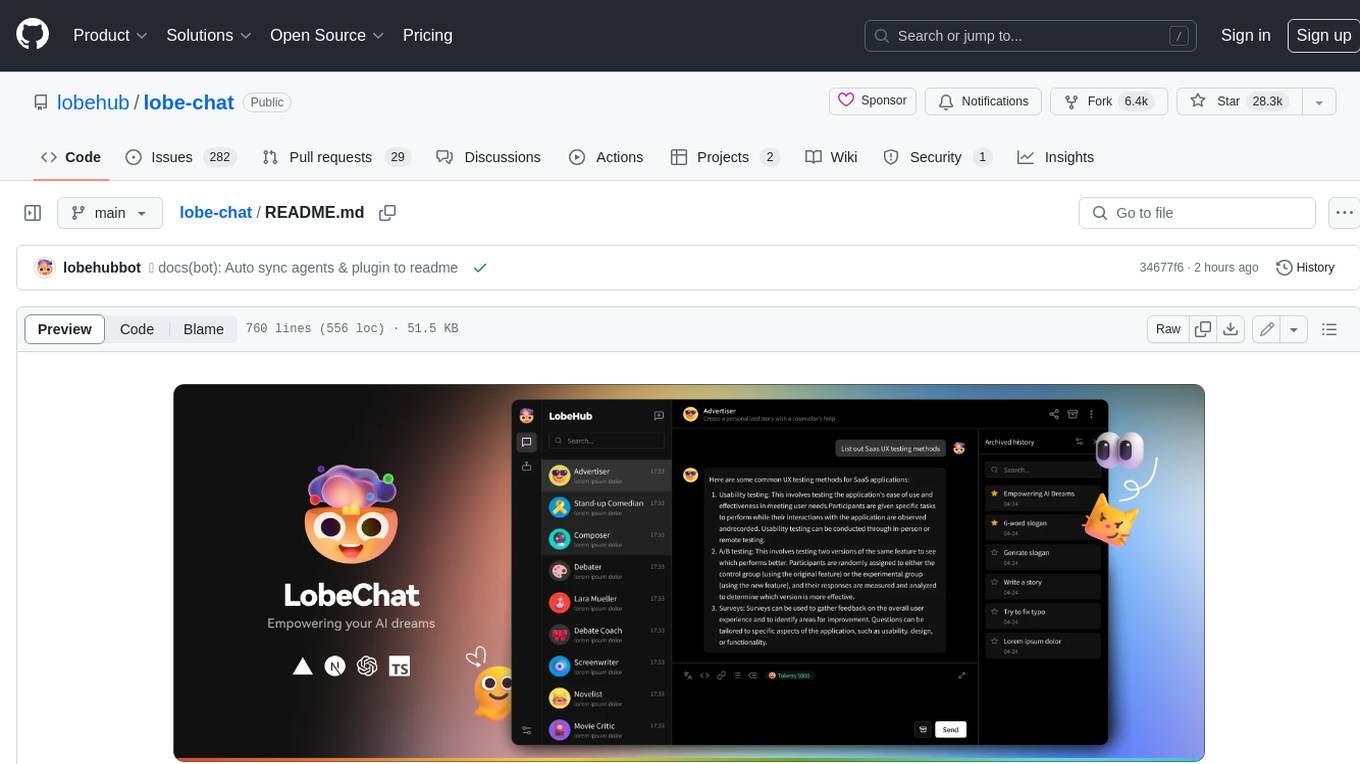
Lobe Chat is an open-source, modern-design ChatGPT/LLMs UI/Framework. Supports speech-synthesis, multi-modal, and extensible ([function call][docs-functionc-call]) plugin system. One-click **FREE** deployment of your private OpenAI ChatGPT/Claude/Gemini/Groq/Ollama chat application.
README:
An open-source, modern design ChatGPT/LLMs UI/framework.
Supports speech synthesis, multi-modal, and extensible (function call) plugin system.
One-click FREE deployment of your private OpenAI ChatGPT/Claude/Gemini/Groq/Ollama chat application.
English · 简体中文 · Official Site · Changelog · Documents · Blog · Feedback
Share LobeChat Repository
Pioneering the new age of thinking and creating. Built for you, the Super Individual.
Table of contents
- 👋🏻 Getting Started & Join Our Community
-
✨ Features
- ✨ MCP Plugin One-Click Installation
- 🏪 MCP Marketplace
- 🖥️ Desktop App
- 🌐 Smart Internet Search
- Chain of Thought
- Branching Conversations
- Artifacts Support
- File Upload /Knowledge Base
- Multi-Model Service Provider Support
- Local Large Language Model (LLM) Support
- Model Visual Recognition
- TTS & STT Voice Conversation
- Text to Image Generation
- Plugin System (Function Calling)
- Agent Market (GPTs)
- Support Local / Remote Database
- Support Multi-User Management
- Progressive Web App (PWA)
- Mobile Device Adaptation
- Custom Themes
*What's more
- ⚡️ Performance
- 🛳 Self Hosting
- 📦 Ecosystem
- 🧩 Plugins
- ⌨️ Local Development
- 🤝 Contributing
- ❤️ Sponsor
- 🔗 More Products
We are a group of e/acc design-engineers, hoping to provide modern design components and tools for AIGC. By adopting the Bootstrapping approach, we aim to provide developers and users with a more open, transparent, and user-friendly product ecosystem.
Whether for users or professional developers, LobeHub will be your AI Agent playground. Please be aware that LobeChat is currently under active development, and feedback is welcome for any issues encountered.
[!IMPORTANT]
Star Us, You will receive all release notifications from GitHub without any delay ~ ⭐️
Transform your AI experience with LobeChat's powerful features designed for seamless connectivity, enhanced productivity, and unlimited creativity.
Seamlessly Connect Your AI to the World
Unlock the full potential of your AI by enabling smooth, secure, and dynamic interactions with external tools, data sources, and services. LobeChat's MCP (Model Context Protocol) plugin system breaks down the barriers between your AI and the digital ecosystem, allowing for unprecedented connectivity and functionality.
Transform your conversations into powerful workflows by connecting to databases, APIs, file systems, and more. Experience the freedom of AI that truly understands and interacts with your world.
Discover, Connect, Extend
Browse a growing library of MCP plugins to expand your AI's capabilities and streamline your workflows effortlessly. Visit lobehub.com/mcp to explore the MCP Marketplace, which offers a curated collection of integrations that enhance your AI's ability to work with various tools and services.
From productivity tools to development environments, discover new ways to extend your AI's reach and effectiveness. Connect with the community and find the perfect plugins for your specific needs.
Peak Performance, Zero Distractions
Get the full LobeChat experience without browser limitations—comprehensive, focused, and always ready to go. Our desktop application provides a dedicated environment for your AI interactions, ensuring optimal performance and minimal distractions.
Experience faster response times, better resource management, and a more stable connection to your AI assistant. The desktop app is designed for users who demand the best performance from their AI tools.
Online Knowledge On Demand
With real-time internet access, your AI keeps up with the world—news, data, trends, and more. Stay informed and get the most current information available, enabling your AI to provide accurate and up-to-date responses.
Access live information, verify facts, and explore current events without leaving your conversation. Your AI becomes a gateway to the world's knowledge, always current and comprehensive.
Experience AI reasoning like never before. Watch as complex problems unfold step by step through our innovative Chain of Thought (CoT) visualization. This breakthrough feature provides unprecedented transparency into AI's decision-making process, allowing you to observe how conclusions are reached in real-time.
By breaking down complex reasoning into clear, logical steps, you can better understand and validate the AI's problem-solving approach. Whether you're debugging, learning, or simply curious about AI reasoning, CoT visualization transforms abstract thinking into an engaging, interactive experience.
Introducing a more natural and flexible way to chat with AI. With Branch Conversations, your discussions can flow in multiple directions, just like human conversations do. Create new conversation branches from any message, giving you the freedom to explore different paths while preserving the original context.
Choose between two powerful modes:
- Continuation Mode: Seamlessly extend your current discussion while maintaining valuable context
- Standalone Mode: Start fresh with a new topic based on any previous message
This groundbreaking feature transforms linear conversations into dynamic, tree-like structures, enabling deeper exploration of ideas and more productive interactions.
Experience the power of Claude Artifacts, now integrated into LobeChat. This revolutionary feature expands the boundaries of AI-human interaction, enabling real-time creation and visualization of diverse content formats.
Create and visualize with unprecedented flexibility:
- Generate and display dynamic SVG graphics
- Build and render interactive HTML pages in real-time
- Produce professional documents in multiple formats
LobeChat supports file upload and knowledge base functionality. You can upload various types of files including documents, images, audio, and video, as well as create knowledge bases, making it convenient for users to manage and search for files. Additionally, you can utilize files and knowledge base features during conversations, enabling a richer dialogue experience.
https://github.com/user-attachments/assets/faa8cf67-e743-4590-8bf6-ebf6ccc34175
[!TIP]
Learn more on 📘 LobeChat Knowledge Base Launch — From Now On, Every Step Counts
In the continuous development of LobeChat, we deeply understand the importance of diversity in model service providers for meeting the needs of the community when providing AI conversation services. Therefore, we have expanded our support to multiple model service providers, rather than being limited to a single one, in order to offer users a more diverse and rich selection of conversations.
In this way, LobeChat can more flexibly adapt to the needs of different users, while also providing developers with a wider range of choices.
We have implemented support for the following model service providers:
- OpenAI: OpenAI is a global leader in artificial intelligence research, with models like the GPT series pushing the frontiers of natural language processing. OpenAI is committed to transforming multiple industries through innovative and efficient AI solutions. Their products demonstrate significant performance and cost-effectiveness, widely used in research, business, and innovative applications.
- Ollama: Ollama provides models that cover a wide range of fields, including code generation, mathematical operations, multilingual processing, and conversational interaction, catering to diverse enterprise-level and localized deployment needs.
- Anthropic: Anthropic is a company focused on AI research and development, offering a range of advanced language models such as Claude 3.5 Sonnet, Claude 3 Sonnet, Claude 3 Opus, and Claude 3 Haiku. These models achieve an ideal balance between intelligence, speed, and cost, suitable for various applications from enterprise workloads to rapid-response scenarios. Claude 3.5 Sonnet, as their latest model, has excelled in multiple evaluations while maintaining a high cost-performance ratio.
- Bedrock: Bedrock is a service provided by Amazon AWS, focusing on delivering advanced AI language and visual models for enterprises. Its model family includes Anthropic's Claude series, Meta's Llama 3.1 series, and more, offering a range of options from lightweight to high-performance, supporting tasks such as text generation, conversation, and image processing for businesses of varying scales and needs.
- Google: Google's Gemini series represents its most advanced, versatile AI models, developed by Google DeepMind, designed for multimodal capabilities, supporting seamless understanding and processing of text, code, images, audio, and video. Suitable for various environments from data centers to mobile devices, it significantly enhances the efficiency and applicability of AI models.
- DeepSeek: DeepSeek is a company focused on AI technology research and application, with its latest model DeepSeek-V2.5 integrating general dialogue and code processing capabilities, achieving significant improvements in human preference alignment, writing tasks, and instruction following.
- Moonshot: Moonshot is an open-source platform launched by Beijing Dark Side Technology Co., Ltd., providing various natural language processing models with a wide range of applications, including but not limited to content creation, academic research, intelligent recommendations, and medical diagnosis, supporting long text processing and complex generation tasks.
- OpenRouter: OpenRouter is a service platform providing access to various cutting-edge large model interfaces, supporting OpenAI, Anthropic, LLaMA, and more, suitable for diverse development and application needs. Users can flexibly choose the optimal model and pricing based on their requirements, enhancing the AI experience.
- HuggingFace: The HuggingFace Inference API provides a fast and free way for you to explore thousands of models for various tasks. Whether you are prototyping for a new application or experimenting with the capabilities of machine learning, this API gives you instant access to high-performance models across multiple domains.
- Cloudflare Workers AI: Run serverless GPU-powered machine learning models on Cloudflare's global network.
See more providers (+32)
- GitHub: With GitHub Models, developers can become AI engineers and leverage the industry's leading AI models.
- Novita: Novita AI is a platform providing a variety of large language models and AI image generation API services, flexible, reliable, and cost-effective. It supports the latest open-source models like Llama3 and Mistral, offering a comprehensive, user-friendly, and auto-scaling API solution for generative AI application development, suitable for the rapid growth of AI startups.
- PPIO: PPIO supports stable and cost-efficient open-source LLM APIs, such as DeepSeek, Llama, Qwen etc.
- 302.AI: 302.AI is an on-demand AI application platform offering the most comprehensive AI APIs and online AI applications available on the market.
- Together AI: Together AI is dedicated to achieving leading performance through innovative AI models, offering extensive customization capabilities, including rapid scaling support and intuitive deployment processes to meet various enterprise needs.
- Fireworks AI: Fireworks AI is a leading provider of advanced language model services, focusing on functional calling and multimodal processing. Its latest model, Firefunction V2, is based on Llama-3, optimized for function calling, conversation, and instruction following. The visual language model FireLLaVA-13B supports mixed input of images and text. Other notable models include the Llama series and Mixtral series, providing efficient multilingual instruction following and generation support.
- Groq: Groq's LPU inference engine has excelled in the latest independent large language model (LLM) benchmarks, redefining the standards for AI solutions with its remarkable speed and efficiency. Groq represents instant inference speed, demonstrating strong performance in cloud-based deployments.
- Perplexity: Perplexity is a leading provider of conversational generation models, offering various advanced Llama 3.1 models that support both online and offline applications, particularly suited for complex natural language processing tasks.
- Mistral: Mistral provides advanced general, specialized, and research models widely used in complex reasoning, multilingual tasks, and code generation. Through functional calling interfaces, users can integrate custom functionalities for specific applications.
- ModelScope: ModelScope is a model-as-a-service platform launched by Alibaba Cloud, offering a wide range of AI models and inference services.
- Ai21Labs: AI21 Labs builds foundational models and AI systems for enterprises, accelerating the application of generative AI in production.
- Upstage: Upstage focuses on developing AI models for various business needs, including Solar LLM and document AI, aiming to achieve artificial general intelligence (AGI) for work. It allows for the creation of simple conversational agents through Chat API and supports functional calling, translation, embedding, and domain-specific applications.
- xAI (Grok): xAI is a company dedicated to building artificial intelligence to accelerate human scientific discovery. Our mission is to advance our collective understanding of the universe.
- Aliyun Bailian: Tongyi Qianwen is a large-scale language model independently developed by Alibaba Cloud, featuring strong natural language understanding and generation capabilities. It can answer various questions, create written content, express opinions, and write code, playing a role in multiple fields.
- Wenxin: An enterprise-level one-stop platform for large model and AI-native application development and services, providing the most comprehensive and user-friendly toolchain for the entire process of generative artificial intelligence model development and application development.
- Hunyuan: A large language model developed by Tencent, equipped with powerful Chinese creative capabilities, logical reasoning abilities in complex contexts, and reliable task execution skills.
- ZhiPu: Zhipu AI offers an open platform for multimodal and language models, supporting a wide range of AI application scenarios, including text processing, image understanding, and programming assistance.
- SiliconCloud: SiliconFlow is dedicated to accelerating AGI for the benefit of humanity, enhancing large-scale AI efficiency through an easy-to-use and cost-effective GenAI stack.
- 01.AI: 01.AI focuses on AI 2.0 era technologies, vigorously promoting the innovation and application of 'human + artificial intelligence', using powerful models and advanced AI technologies to enhance human productivity and achieve technological empowerment.
- Spark: iFlytek's Spark model provides powerful AI capabilities across multiple domains and languages, utilizing advanced natural language processing technology to build innovative applications suitable for smart hardware, smart healthcare, smart finance, and other vertical scenarios.
- SenseNova: SenseNova, backed by SenseTime's robust infrastructure, offers efficient and user-friendly full-stack large model services.
- Stepfun: StepFun's large model possesses industry-leading multimodal and complex reasoning capabilities, supporting ultra-long text understanding and powerful autonomous scheduling search engine functions.
- Baichuan: Baichuan Intelligence is a company focused on the research and development of large AI models, with its models excelling in domestic knowledge encyclopedias, long text processing, and generative creation tasks in Chinese, surpassing mainstream foreign models. Baichuan Intelligence also possesses industry-leading multimodal capabilities, performing excellently in multiple authoritative evaluations. Its models include Baichuan 4, Baichuan 3 Turbo, and Baichuan 3 Turbo 128k, each optimized for different application scenarios, providing cost-effective solutions.
- Minimax: MiniMax is a general artificial intelligence technology company established in 2021, dedicated to co-creating intelligence with users. MiniMax has independently developed general large models of different modalities, including trillion-parameter MoE text models, voice models, and image models, and has launched applications such as Conch AI.
- InternLM: An open-source organization dedicated to the research and development of large model toolchains. It provides an efficient and user-friendly open-source platform for all AI developers, making cutting-edge large models and algorithm technologies easily accessible.
- Higress: Higress is a cloud-native API gateway that was developed internally at Alibaba to address the issues of Tengine reload affecting long-lived connections and the insufficient load balancing capabilities for gRPC/Dubbo.
- Gitee AI: Gitee AI's Serverless API provides AI developers with an out of the box large model inference API service.
- Taichu: The Institute of Automation, Chinese Academy of Sciences, and Wuhan Artificial Intelligence Research Institute have launched a new generation of multimodal large models, supporting comprehensive question-answering tasks such as multi-turn Q&A, text creation, image generation, 3D understanding, and signal analysis, with stronger cognitive, understanding, and creative abilities, providing a new interactive experience.
- 360 AI: 360 AI is an AI model and service platform launched by 360 Company, offering various advanced natural language processing models, including 360GPT2 Pro, 360GPT Pro, 360GPT Turbo, and 360GPT Turbo Responsibility 8K. These models combine large-scale parameters and multimodal capabilities, widely applied in text generation, semantic understanding, dialogue systems, and code generation. With flexible pricing strategies, 360 AI meets diverse user needs, supports developer integration, and promotes the innovation and development of intelligent applications.
- Search1API: Search1API provides access to the DeepSeek series of models that can connect to the internet as needed, including standard and fast versions, supporting a variety of model sizes.
- InfiniAI: Provides high-performance, easy-to-use, and secure large model services for application developers, covering the entire process from large model development to service deployment.
- Qiniu: Qiniu, as a long-established cloud service provider, delivers cost-effective and reliable AI inference services for both real-time and batch processing, with a simple and user-friendly experience.
📊 Total providers: 42
At the same time, we are also planning to support more model service providers. If you would like LobeChat to support your favorite service provider, feel free to join our 💬 community discussion.
To meet the specific needs of users, LobeChat also supports the use of local models based on Ollama, allowing users to flexibly use their own or third-party models.
[!TIP]
Learn more about 📘 Using Ollama in LobeChat by checking it out.
LobeChat now supports OpenAI's latest gpt-4-vision model with visual recognition capabilities,
a multimodal intelligence that can perceive visuals. Users can easily upload or drag and drop images into the dialogue box,
and the agent will be able to recognize the content of the images and engage in intelligent conversation based on this,
creating smarter and more diversified chat scenarios.
This feature opens up new interactive methods, allowing communication to transcend text and include a wealth of visual elements. Whether it's sharing images in daily use or interpreting images within specific industries, the agent provides an outstanding conversational experience.
LobeChat supports Text-to-Speech (TTS) and Speech-to-Text (STT) technologies, enabling our application to convert text messages into clear voice outputs, allowing users to interact with our conversational agent as if they were talking to a real person. Users can choose from a variety of voices to pair with the agent.
Moreover, TTS offers an excellent solution for those who prefer auditory learning or desire to receive information while busy. In LobeChat, we have meticulously selected a range of high-quality voice options (OpenAI Audio, Microsoft Edge Speech) to meet the needs of users from different regions and cultural backgrounds. Users can choose the voice that suits their personal preferences or specific scenarios, resulting in a personalized communication experience.
With support for the latest text-to-image generation technology, LobeChat now allows users to invoke image creation tools directly within conversations with the agent. By leveraging the capabilities of AI tools such as DALL-E 3, MidJourney, and Pollinations, the agents are now equipped to transform your ideas into images.
This enables a more private and immersive creative process, allowing for the seamless integration of visual storytelling into your personal dialogue with the agent.
The plugin ecosystem of LobeChat is an important extension of its core functionality, greatly enhancing the practicality and flexibility of the LobeChat assistant.
By utilizing plugins, LobeChat assistants can obtain and process real-time information, such as searching for web information and providing users with instant and relevant news.
In addition, these plugins are not limited to news aggregation, but can also extend to other practical functions, such as quickly searching documents, generating images, obtaining data from various platforms like Bilibili, Steam, and interacting with various third-party services.
[!TIP]
Learn more about 📘 Plugin Usage by checking it out.
| Recent Submits | Description |
|---|---|
|
PortfolioMeta By portfoliometa on 2025-09-27 |
Analyze stocks and get comprehensive real-time investment data and analytics.stock
|
|
Web By Proghit on 2025-01-24 |
Smart web search that reads and analyzes pages to deliver comprehensive answers from Google results.web search
|
|
Bing_websearch By FineHow on 2024-12-22 |
Search for information from the internet base BingApibingsearch
|
|
Google CSE By vsnthdev on 2024-12-02 |
Searches Google through their official CSE API.web search
|
📊 Total plugins: 42
In LobeChat Agent Marketplace, creators can discover a vibrant and innovative community that brings together a multitude of well-designed agents, which not only play an important role in work scenarios but also offer great convenience in learning processes. Our marketplace is not just a showcase platform but also a collaborative space. Here, everyone can contribute their wisdom and share the agents they have developed.
[!TIP]
By 🤖/🏪 Submit Agents, you can easily submit your agent creations to our platform. Importantly, LobeChat has established a sophisticated automated internationalization (i18n) workflow, capable of seamlessly translating your agent into multiple language versions. This means that no matter what language your users speak, they can experience your agent without barriers.
[!IMPORTANT]
We welcome all users to join this growing ecosystem and participate in the iteration and optimization of agents. Together, we can create more interesting, practical, and innovative agents, further enriching the diversity and practicality of the agent offerings.
| Recent Submits | Description |
|---|---|
|
Turtle Soup Host By CSY2022 on 2025-06-19 |
A turtle soup host needs to provide the scenario, the complete story (truth of the event), and the key point (the condition for guessing correctly).turtle-soup reasoning interaction puzzle role-playing
|
|
Gourmet Reviewer🍟 By renhai-lab on 2025-06-17 |
Food critique expertgourmet review writing
|
|
Academic Writing Assistant By swarfte on 2025-06-17 |
Expert in academic research paper writing and formal documentationacademic-writing research formal-style
|
|
Minecraft Senior Developer By iamyuuk on 2025-06-17 |
Expert in advanced Java development and Minecraft mod and server plugin developmentdevelopment programming minecraft java
|
📊 Total agents: 505
LobeChat supports the use of both server-side and local databases. Depending on your needs, you can choose the appropriate deployment solution:
- Local database: suitable for users who want more control over their data and privacy protection. LobeChat uses CRDT (Conflict-Free Replicated Data Type) technology to achieve multi-device synchronization. This is an experimental feature aimed at providing a seamless data synchronization experience.
- Server-side database: suitable for users who want a more convenient user experience. LobeChat supports PostgreSQL as a server-side database. For detailed documentation on how to configure the server-side database, please visit Configure Server-side Database.
Regardless of which database you choose, LobeChat can provide you with an excellent user experience.
LobeChat supports multi-user management and provides two main user authentication and management solutions to meet different needs:
-
next-auth: LobeChat integrates
next-auth, a flexible and powerful identity verification library that supports multiple authentication methods, including OAuth, email login, credential login, etc. Withnext-auth, you can easily implement user registration, login, session management, social login, and other functions to ensure the security and privacy of user data. -
Clerk: For users who need more advanced user management features, LobeChat also supports
Clerk, a modern user management platform.Clerkprovides richer functions, such as multi-factor authentication (MFA), user profile management, login activity monitoring, etc. WithClerk, you can get higher security and flexibility, and easily cope with complex user management needs.
Regardless of which user management solution you choose, LobeChat can provide you with an excellent user experience and powerful functional support.
We deeply understand the importance of providing a seamless experience for users in today's multi-device environment. Therefore, we have adopted Progressive Web Application (PWA) technology, a modern web technology that elevates web applications to an experience close to that of native apps.
Through PWA, LobeChat can offer a highly optimized user experience on both desktop and mobile devices while maintaining high-performance characteristics. Visually and in terms of feel, we have also meticulously designed the interface to ensure it is indistinguishable from native apps, providing smooth animations, responsive layouts, and adapting to different device screen resolutions.
[!NOTE]
If you are unfamiliar with the installation process of PWA, you can add LobeChat as your desktop application (also applicable to mobile devices) by following these steps:
- Launch the Chrome or Edge browser on your computer.
- Visit the LobeChat webpage.
- In the upper right corner of the address bar, click on the Install icon.
- Follow the instructions on the screen to complete the PWA Installation.
We have carried out a series of optimization designs for mobile devices to enhance the user's mobile experience. Currently, we are iterating on the mobile user experience to achieve smoother and more intuitive interactions. If you have any suggestions or ideas, we welcome you to provide feedback through GitHub Issues or Pull Requests.
As a design-engineering-oriented application, LobeChat places great emphasis on users' personalized experiences, hence introducing flexible and diverse theme modes, including a light mode for daytime and a dark mode for nighttime. Beyond switching theme modes, a range of color customization options allow users to adjust the application's theme colors according to their preferences. Whether it's a desire for a sober dark blue, a lively peach pink, or a professional gray-white, users can find their style of color choices in LobeChat.
[!TIP]
The default configuration can intelligently recognize the user's system color mode and automatically switch themes to ensure a consistent visual experience with the operating system. For users who like to manually control details, LobeChat also offers intuitive setting options and a choice between chat bubble mode and document mode for conversation scenarios.
Beside these features, LobeChat also have much better basic technique underground:
- [x] 💨 Quick Deployment: Using the Vercel platform or docker image, you can deploy with just one click and complete the process within 1 minute without any complex configuration.
- [x] 🌐 Custom Domain: If users have their own domain, they can bind it to the platform for quick access to the dialogue agent from anywhere.
- [x] 🔒 Privacy Protection: All data is stored locally in the user's browser, ensuring user privacy.
- [x] 💎 Exquisite UI Design: With a carefully designed interface, it offers an elegant appearance and smooth interaction. It supports light and dark themes and is mobile-friendly. PWA support provides a more native-like experience.
- [x] 🗣️ Smooth Conversation Experience: Fluid responses ensure a smooth conversation experience. It fully supports Markdown rendering, including code highlighting, LaTex formulas, Mermaid flowcharts, and more.
✨ more features will be added when LobeChat evolve.
[!NOTE]
You can find our upcoming Roadmap plans in the Projects section.
[!NOTE]
The complete list of reports can be found in the 📘 Lighthouse Reports
| Desktop | Mobile |
|---|---|
| 📑 Lighthouse Report | 📑 Lighthouse Report |
LobeChat provides Self-Hosted Version with Vercel, Alibaba Cloud, and Docker Image. This allows you to deploy your own chatbot within a few minutes without any prior knowledge.
[!TIP]
Learn more about 📘 Build your own LobeChat by checking it out.
"If you want to deploy this service yourself on Vercel, Zeabur or Alibaba Cloud, you can follow these steps:
- Prepare your OpenAI API Key.
- Click the button below to start deployment: Log in directly with your GitHub account, and remember to fill in the
OPENAI_API_KEY(required) andACCESS_CODE(recommended) on the environment variable section. - After deployment, you can start using it.
- Bind a custom domain (optional): The DNS of the domain assigned by Vercel is polluted in some areas; binding a custom domain can connect directly.
| Deploy with Vercel | Deploy with Zeabur | Deploy with Sealos | Deploy with RepoCloud | Deploy with Alibaba Cloud |
|---|---|---|---|---|
 |
After fork, only retain the upstream sync action and disable other actions in your repository on GitHub.
If you have deployed your own project following the one-click deployment steps in the README, you might encounter constant prompts indicating "updates available." This is because Vercel defaults to creating a new project instead of forking this one, resulting in an inability to detect updates accurately.
[!TIP]
We suggest you redeploy using the following steps, 📘 Auto Sync With Latest
We provide a Docker image for deploying the LobeChat service on your own private device. Use the following command to start the LobeChat service:
- create a folder to for storage files
$ mkdir lobe-chat-db && cd lobe-chat-db- init the LobeChat infrastructure
bash <(curl -fsSL https://lobe.li/setup.sh)- Start the LobeChat service
docker compose up -d[!NOTE]
For detailed instructions on deploying with Docker, please refer to the 📘 Docker Deployment Guide
This project provides some additional configuration items set with environment variables:
| Environment Variable | Required | Description | Example |
|---|---|---|---|
OPENAI_API_KEY |
Yes | This is the API key you apply on the OpenAI account page | sk-xxxxxx...xxxxxx |
OPENAI_PROXY_URL |
No | If you manually configure the OpenAI interface proxy, you can use this configuration item to override the default OpenAI API request base URL |
https://api.chatanywhere.cn or https://aihubmix.com/v1 The default value is https://api.openai.com/v1
|
ACCESS_CODE |
No | Add a password to access this service; you can set a long password to avoid leaking. If this value contains a comma, it is a password array. |
awCTe)re_r74 or rtrt_ewee3@09! or code1,code2,code3
|
OPENAI_MODEL_LIST |
No | Used to control the model list. Use + to add a model, - to hide a model, and model_name=display_name to customize the display name of a model, separated by commas. |
qwen-7b-chat,+glm-6b,-gpt-3.5-turbo |
[!NOTE]
The complete list of environment variables can be found in the 📘 Environment Variables
| NPM | Repository | Description | Version |
|---|---|---|---|
| @lobehub/ui | lobehub/lobe-ui | Open-source UI component library dedicated to building AIGC web applications. |  |
| @lobehub/icons | lobehub/lobe-icons | Popular AI / LLM Model Brand SVG Logo and Icon Collection. | |
| @lobehub/tts | lobehub/lobe-tts | High-quality & reliable TTS/STT React Hooks library |  |
| @lobehub/lint | lobehub/lobe-lint | Configurations for ESlint, Stylelint, Commitlint, Prettier, Remark, and Semantic Release for LobeHub. |  |
Plugins provide a means to extend the Function Calling capabilities of LobeChat. They can be used to introduce new function calls and even new ways to render message results. If you are interested in plugin development, please refer to our 📘 Plugin Development Guide in the Wiki.
- lobe-chat-plugins: This is the plugin index for LobeChat. It accesses index.json from this repository to display a list of available plugins for LobeChat to the user.
- chat-plugin-template: This is the plugin template for LobeChat plugin development.
- @lobehub/chat-plugin-sdk: The LobeChat Plugin SDK assists you in creating exceptional chat plugins for Lobe Chat.
- @lobehub/chat-plugins-gateway: The LobeChat Plugins Gateway is a backend service that provides a gateway for LobeChat plugins. We deploy this service using Vercel. The primary API POST /api/v1/runner is deployed as an Edge Function.
[!NOTE]
The plugin system is currently undergoing major development. You can learn more in the following issues:
- [x] Plugin Phase 1: Implement separation of the plugin from the main body, split the plugin into an independent repository for maintenance, and realize dynamic loading of the plugin.
- [x] Plugin Phase 2: The security and stability of the plugin's use, more accurately presenting abnormal states, the maintainability of the plugin architecture, and developer-friendly.
- [x] Plugin Phase 3: Higher-level and more comprehensive customization capabilities, support for plugin authentication, and examples.
You can use GitHub Codespaces for online development:
Or clone it for local development:
$ git clone https://github.com/lobehub/lobe-chat.git
$ cd lobe-chat
$ pnpm install
$ pnpm devIf you would like to learn more details, please feel free to look at our 📘 Development Guide.
Contributions of all types are more than welcome; if you are interested in contributing code, feel free to check out our GitHub Issues and Projects to get stuck in to show us what you're made of.
[!TIP]
We are creating a technology-driven forum, fostering knowledge interaction and the exchange of ideas that may culminate in mutual inspiration and collaborative innovation.
Help us make LobeChat better. Welcome to provide product design feedback, user experience discussions directly to us.
Principal Maintainers: @arvinxx @canisminor1990
|
|
|
|---|---|
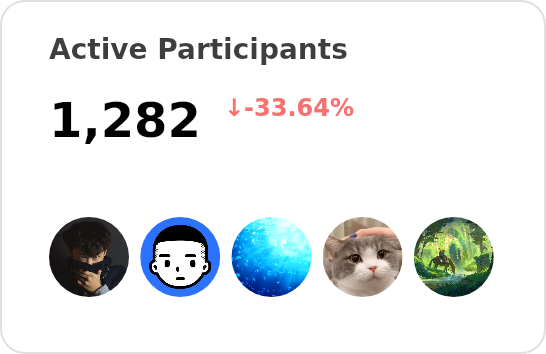
|
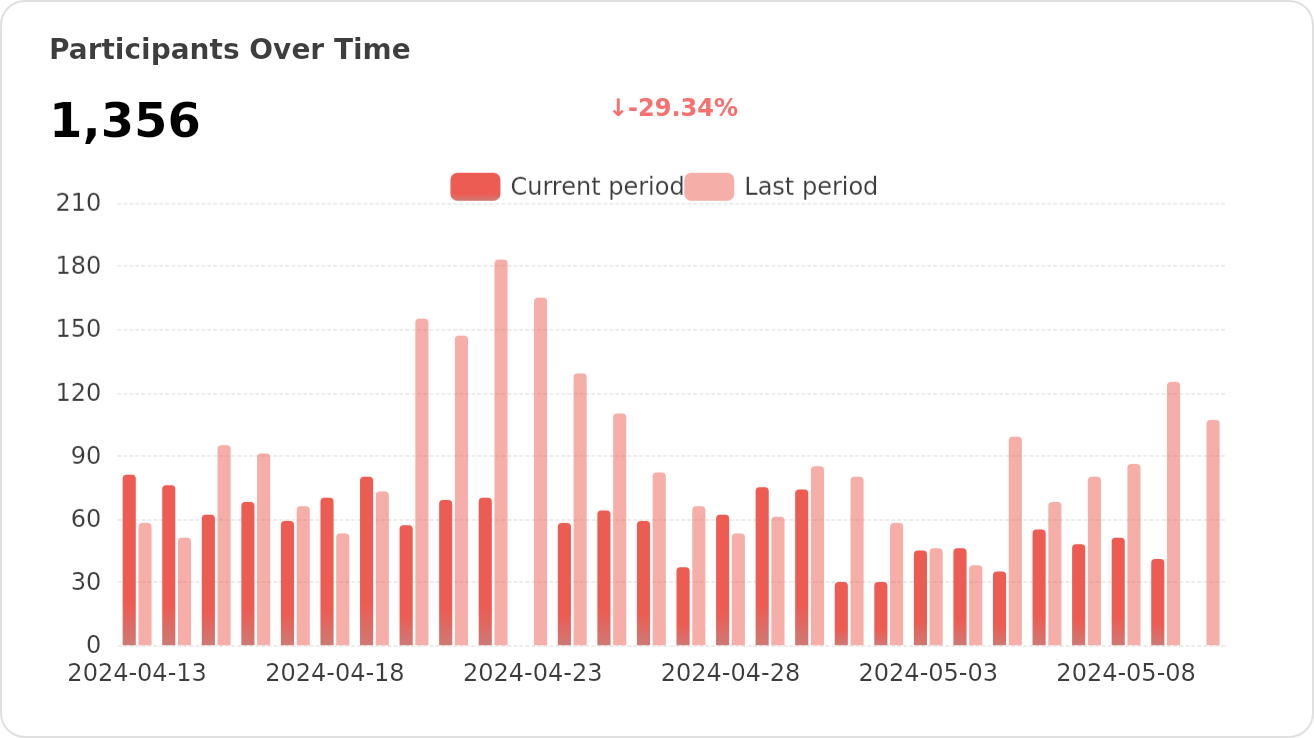
|

|
|
Every bit counts and your one-time donation sparkles in our galaxy of support! You're a shooting star, making a swift and bright impact on our journey. Thank you for believing in us – your generosity guides us toward our mission, one brilliant flash at a time.

-
🅰️ Lobe SD Theme: Modern theme for Stable Diffusion WebUI, exquisite interface design, highly customizable UI, and efficiency-boosting features. - ⛵️ Lobe Midjourney WebUI: WebUI for Midjourney, leverages AI to quickly generate a wide array of rich and diverse images from text prompts, sparking creativity and enhancing conversations.
- 🌏 Lobe i18n : Lobe i18n is an automation tool for the i18n (internationalization) translation process, powered by ChatGPT. It supports features such as automatic splitting of large files, incremental updates, and customization options for the OpenAI model, API proxy, and temperature.
- 💌 Lobe Commit: Lobe Commit is a CLI tool that leverages Langchain/ChatGPT to generate Gitmoji-based commit messages.
Copyright © 2025 LobeHub.
This project is LobeHub Community License licensed.
For Tasks:
Click tags to check more tools for each tasksFor Jobs:
Alternative AI tools for lobe-chat
Similar Open Source Tools

lobe-chat
Lobe Chat is an open-source, modern-design ChatGPT/LLMs UI/Framework. Supports speech-synthesis, multi-modal, and extensible ([function call][docs-functionc-call]) plugin system. One-click **FREE** deployment of your private OpenAI ChatGPT/Claude/Gemini/Groq/Ollama chat application.
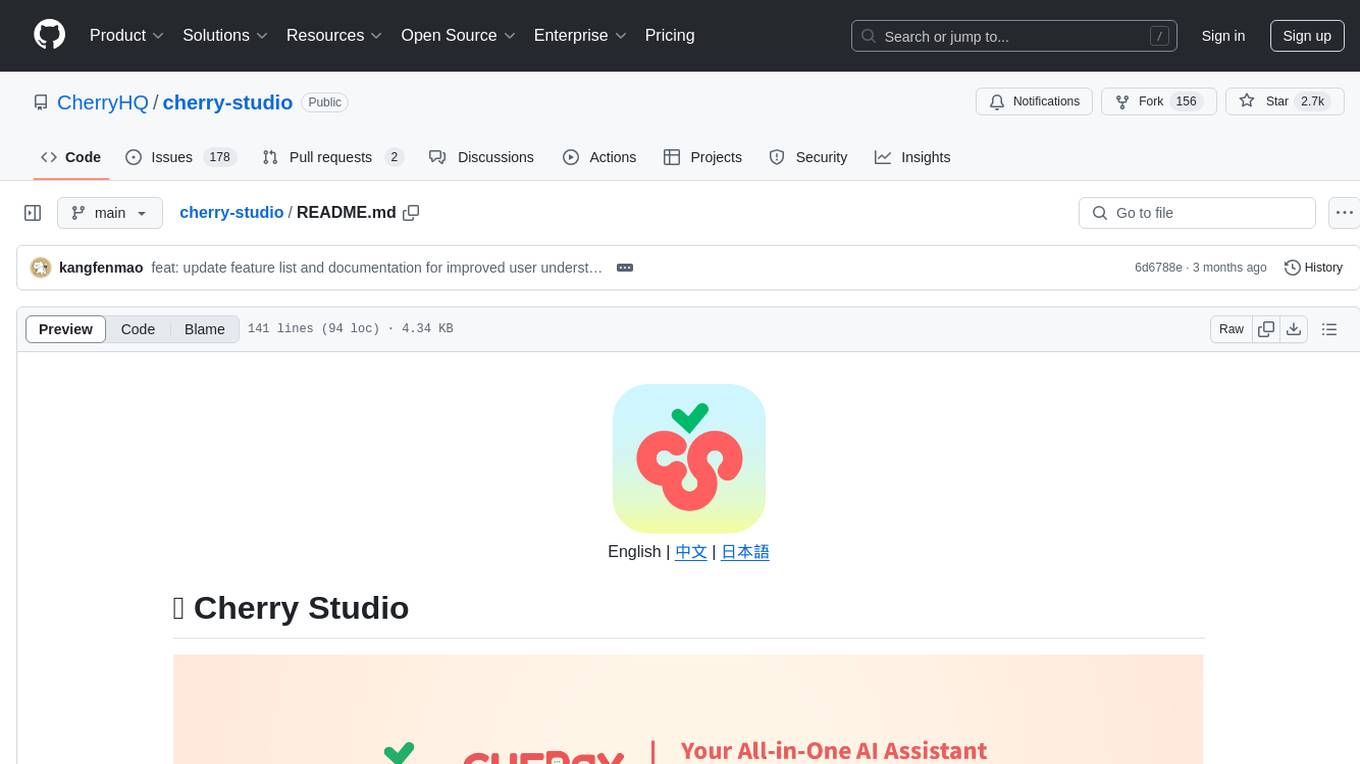
cherry-studio
Cherry Studio is a desktop client that supports multiple LLM providers on Windows, Mac, and Linux. It offers diverse LLM provider support, AI assistants & conversations, document & data processing, practical tools integration, and enhanced user experience. The tool includes features like support for major LLM cloud services, AI web service integration, local model support, pre-configured AI assistants, document processing for text, images, and more, global search functionality, topic management system, AI-powered translation, and cross-platform support with ready-to-use features and themes for a better user experience.
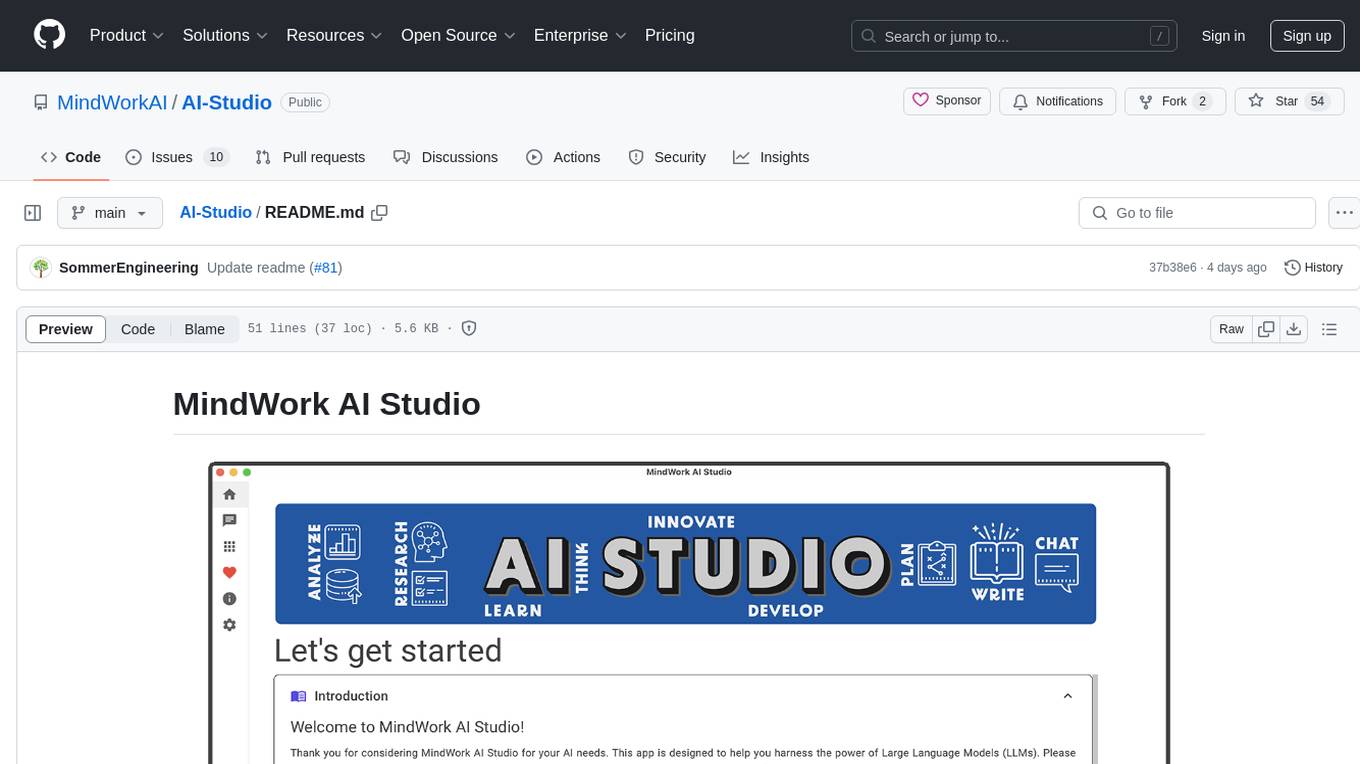
AI-Studio
MindWork AI Studio is a desktop application that provides a unified chat interface for Large Language Models (LLMs). It is free to use for personal and commercial purposes, offers independence in choosing LLM providers, provides unrestricted usage through the providers API, and is cost-effective with pay-as-you-go pricing. The app prioritizes privacy, flexibility, minimal storage and memory usage, and low impact on system resources. Users can support the project through monthly contributions or one-time donations, with opportunities for companies to sponsor the project for public relations and marketing benefits. Planned features include support for more LLM providers, system prompts integration, text replacement for privacy, and advanced interactions tailored for various use cases.
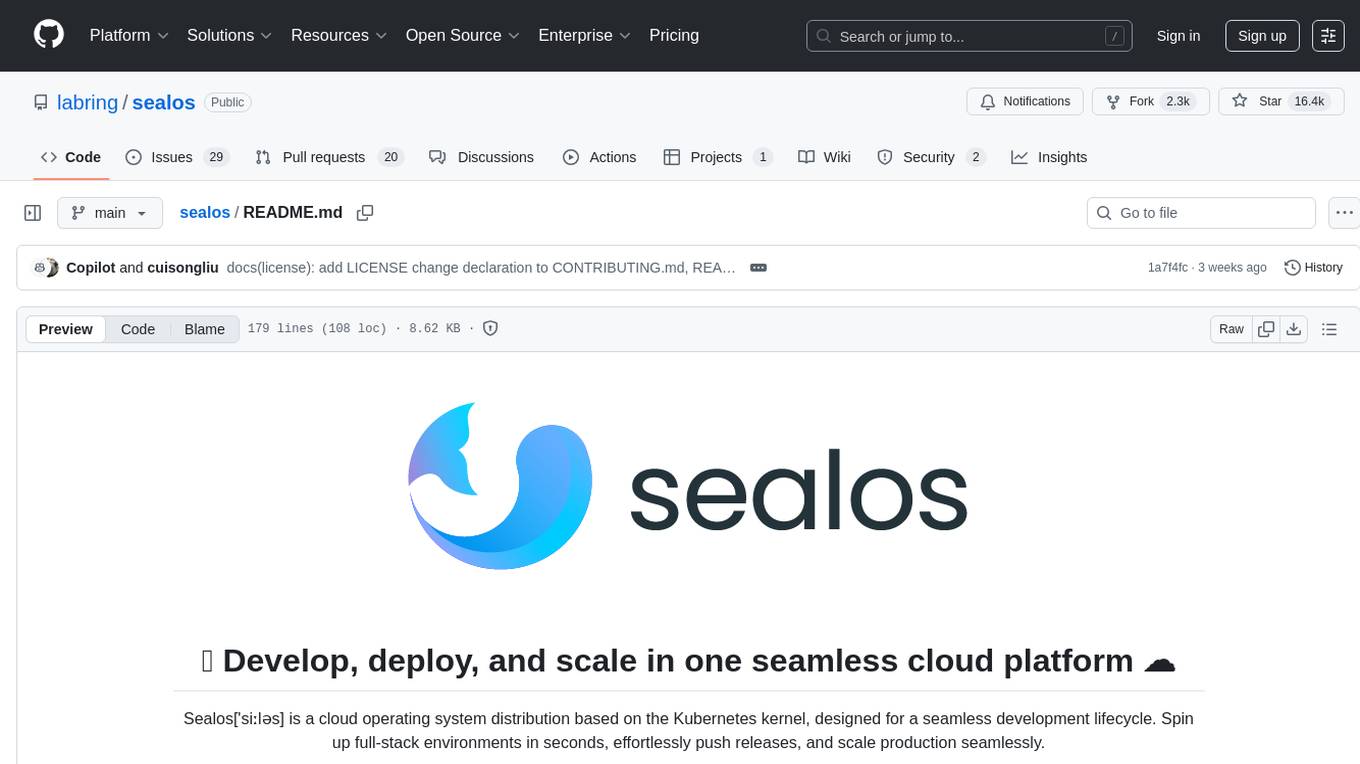
sealos
Sealos is a cloud operating system distribution based on the Kubernetes kernel, designed for a seamless development lifecycle. It allows users to spin up full-stack environments in seconds, effortlessly push releases, and scale production seamlessly. With core features like easy application management, quick database creation, and cloud universality, Sealos offers efficient and economical cloud management with high universality and ease of use. The platform also emphasizes agility and security through its multi-tenancy sharing model. Sealos is supported by a community offering full documentation, Discord support, and active development roadmap.
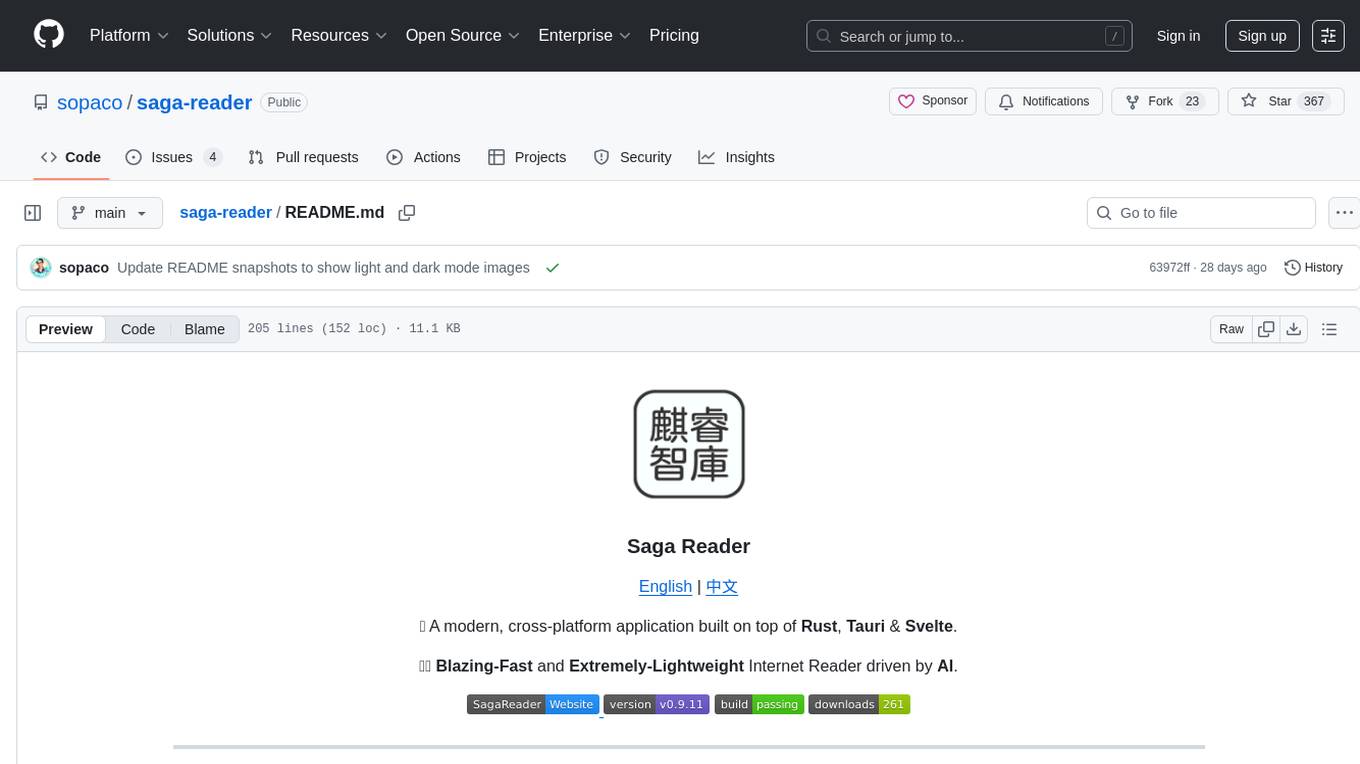
saga-reader
Saga Reader is an AI-driven think tank-style reader that automatically retrieves information from the internet based on user-specified topics and preferences. It uses cloud or local large models to summarize and provide guidance, and it includes an AI-driven interactive companion reading function, allowing you to discuss and exchange ideas with AI about the content you've read. Saga Reader is completely free and open-source, meaning all data is securely stored on your own computer and is not controlled by third-party service providers. Additionally, you can manage your subscription keywords based on your interests and preferences without being disturbed by advertisements and commercialized content.

co-op-translator
Co-op Translator is a tool designed to facilitate communication between team members working on cooperative projects. It allows users to easily translate messages and documents in real-time, enabling seamless collaboration across language barriers. The tool supports multiple languages and provides accurate translations to ensure clear and effective communication within the team. With Co-op Translator, users can improve efficiency, productivity, and teamwork in their cooperative endeavors.
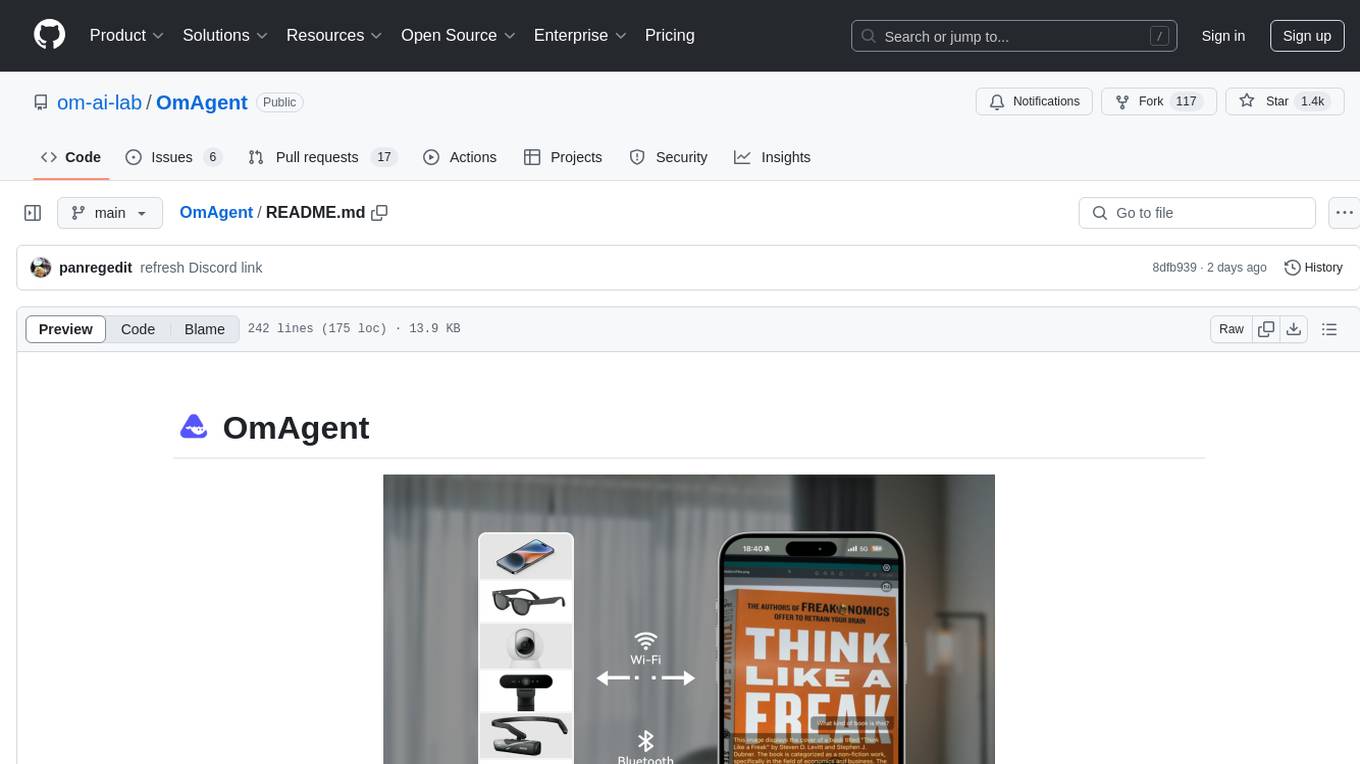
OmAgent
OmAgent is an open-source agent framework designed to streamline the development of on-device multimodal agents. It enables agents to empower various hardware devices, integrates speed-optimized SOTA multimodal models, provides SOTA multimodal agent algorithms, and focuses on optimizing the end-to-end computing pipeline for real-time user interaction experience. Key features include easy connection to diverse devices, scalability, flexibility, and workflow orchestration. The architecture emphasizes graph-based workflow orchestration, native multimodality, and device-centricity, allowing developers to create bespoke intelligent agent programs.
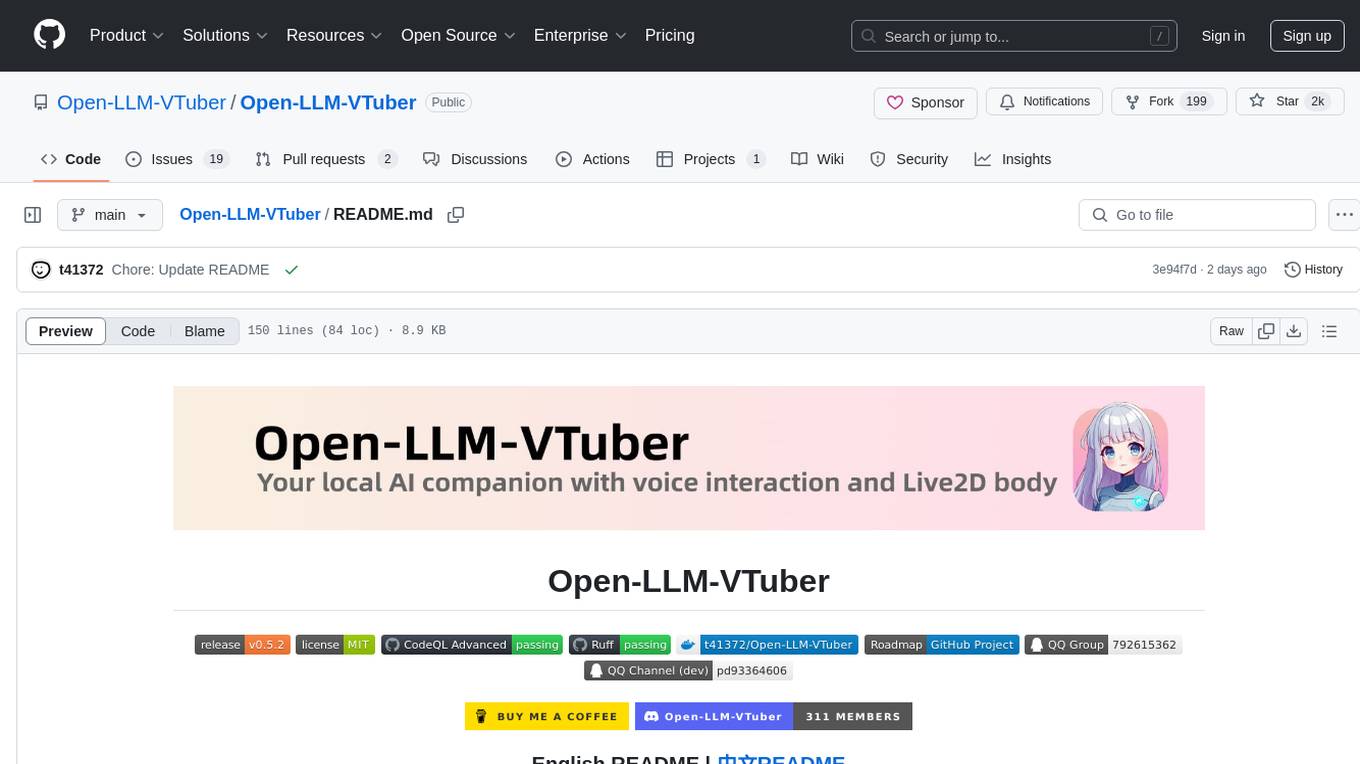
Open-LLM-VTuber
Open-LLM-VTuber is a voice-interactive AI companion supporting real-time voice conversations and featuring a Live2D avatar. It can run offline on Windows, macOS, and Linux, offering web and desktop client modes. Users can customize appearance and persona, with rich LLM inference, text-to-speech, and speech recognition support. The project is highly customizable, extensible, and actively developed with exciting features planned. It provides privacy with offline mode, persistent chat logs, and various interaction features like voice interruption, touch feedback, Live2D expressions, pet mode, and more.
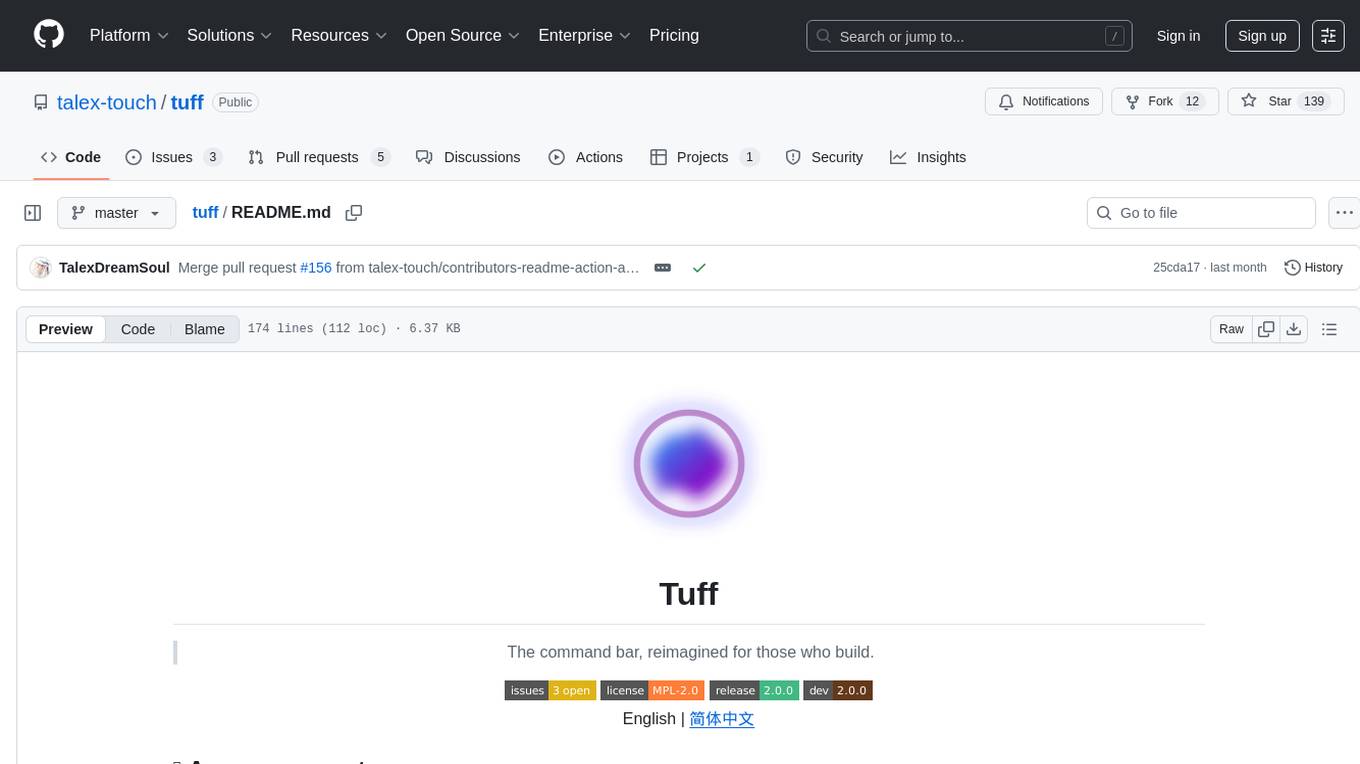
tuff
Tuff is a local-first, AI-native, and infinitely extensible desktop command center designed to enhance workflow efficiency. It offers a seamless integration of core utilities, AI-powered search, contextual intelligence, and extensibility through custom plugins. With a beautiful UI design, rich functionality, simple operations, and a focus on security and reliability, Tuff provides users with a cross-platform desktop software that is easy to use and offers a good user experience.
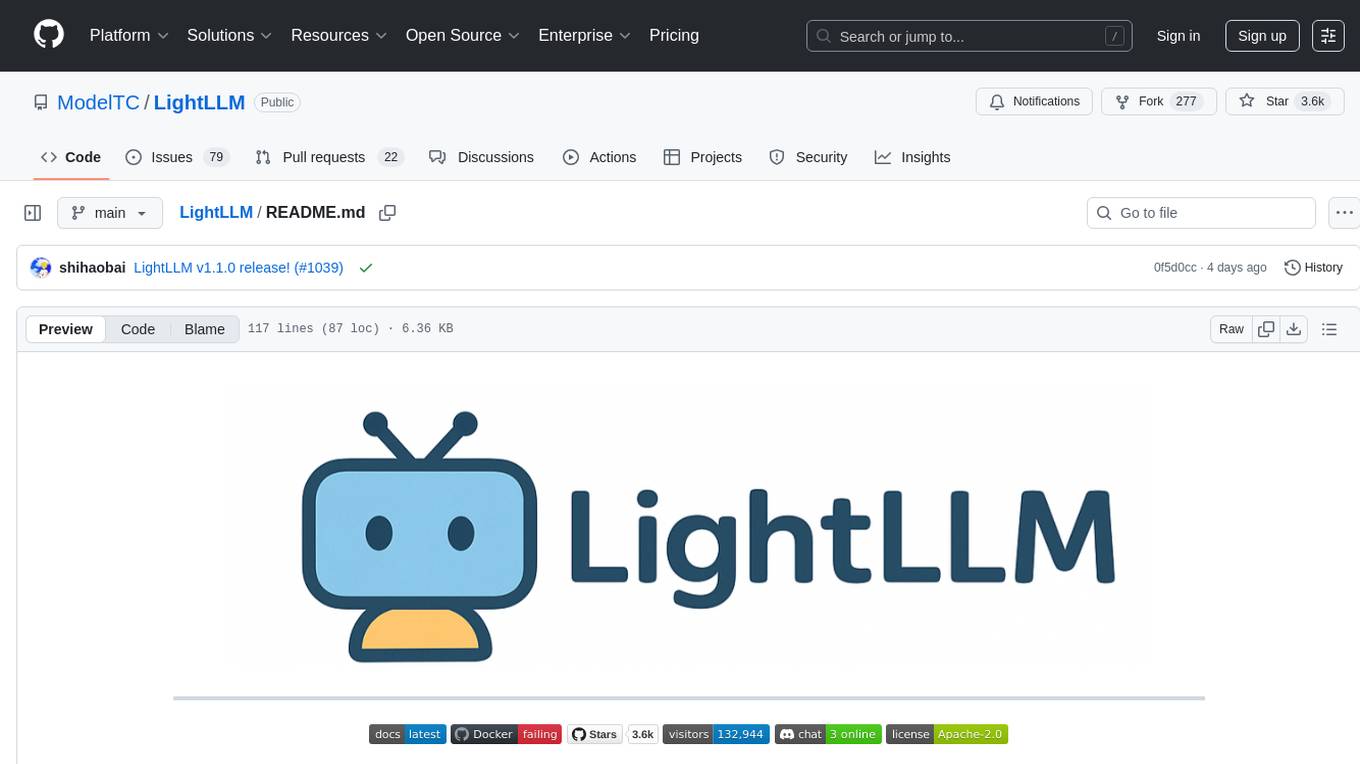
LightLLM
LightLLM is a lightweight library for linear and logistic regression models. It provides a simple and efficient way to train and deploy machine learning models for regression tasks. The library is designed to be easy to use and integrate into existing projects, making it suitable for both beginners and experienced data scientists. With LightLLM, users can quickly build and evaluate regression models using a variety of algorithms and hyperparameters. The library also supports feature engineering and model interpretation, allowing users to gain insights from their data and make informed decisions based on the model predictions.
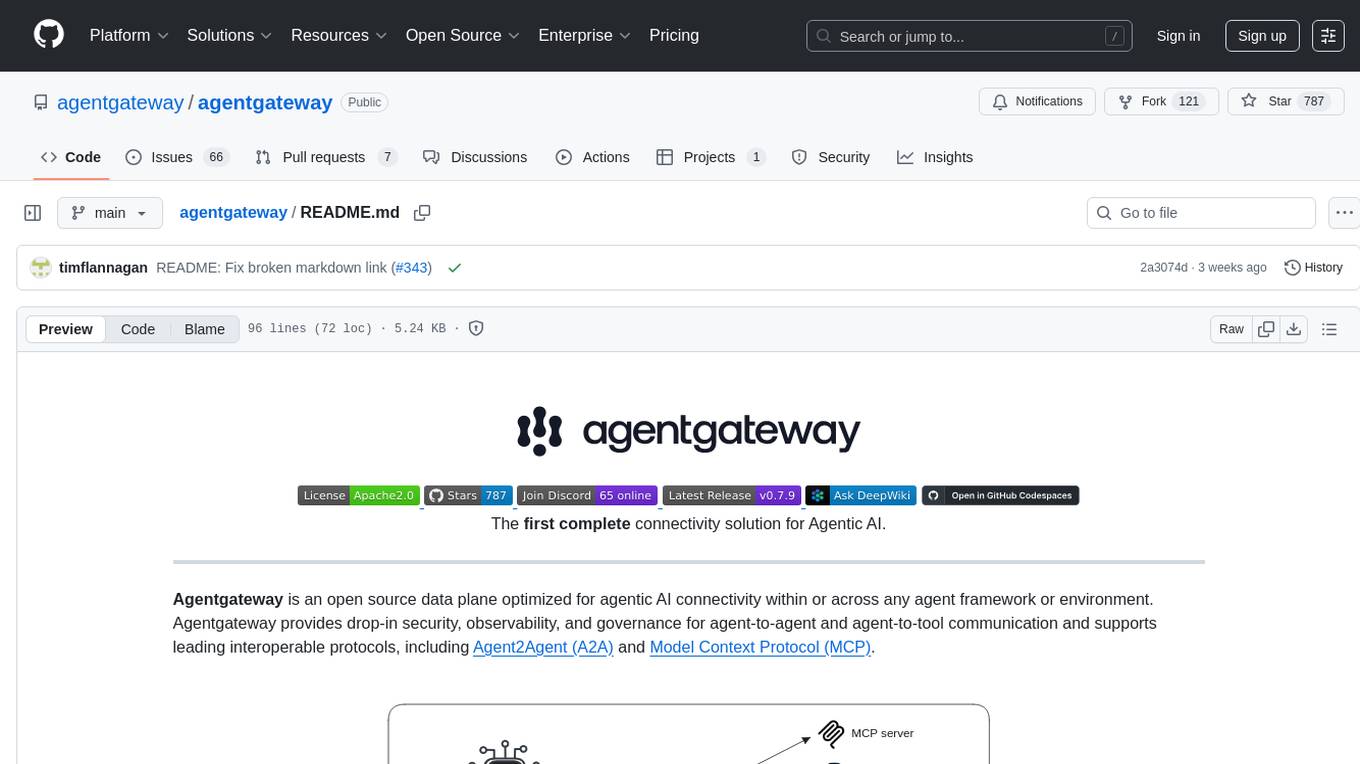
agentgateway
Agentgateway is an open source data plane optimized for agentic AI connectivity within or across any agent framework or environment. It provides drop-in security, observability, and governance for agent-to-agent and agent-to-tool communication, supporting leading interoperable protocols like Agent2Agent (A2A) and Model Context Protocol (MCP). Highly performant, security-first, multi-tenant, dynamic, and supporting legacy API transformation, agentgateway is designed to handle any scale and run anywhere with any agent framework.
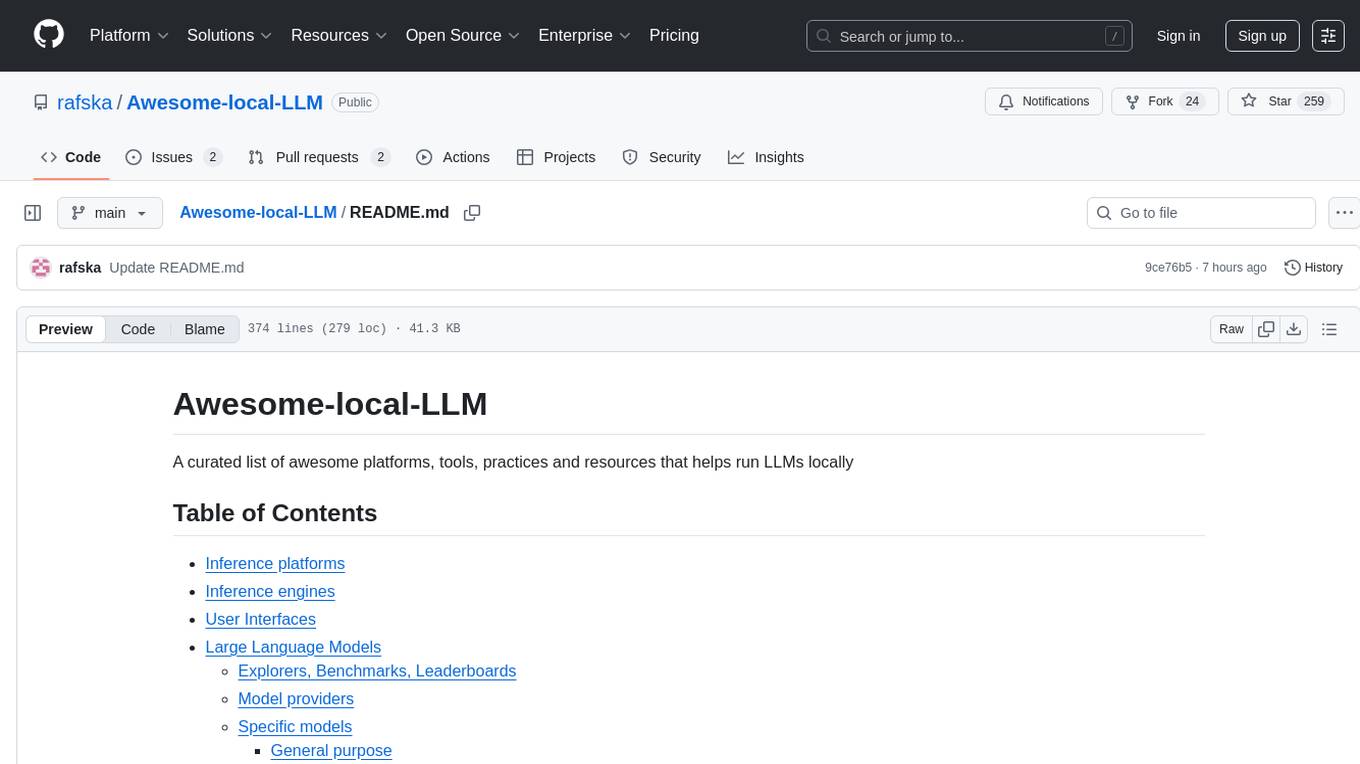
Awesome-local-LLM
Awesome-local-LLM is a curated list of platforms, tools, practices, and resources that help run Large Language Models (LLMs) locally. It includes sections on inference platforms, engines, user interfaces, specific models for general purpose, coding, vision, audio, and miscellaneous tasks. The repository also covers tools for coding agents, agent frameworks, retrieval-augmented generation, computer use, browser automation, memory management, testing, evaluation, research, training, and fine-tuning. Additionally, there are tutorials on models, prompt engineering, context engineering, inference, agents, retrieval-augmented generation, and miscellaneous topics, along with a section on communities for LLM enthusiasts.
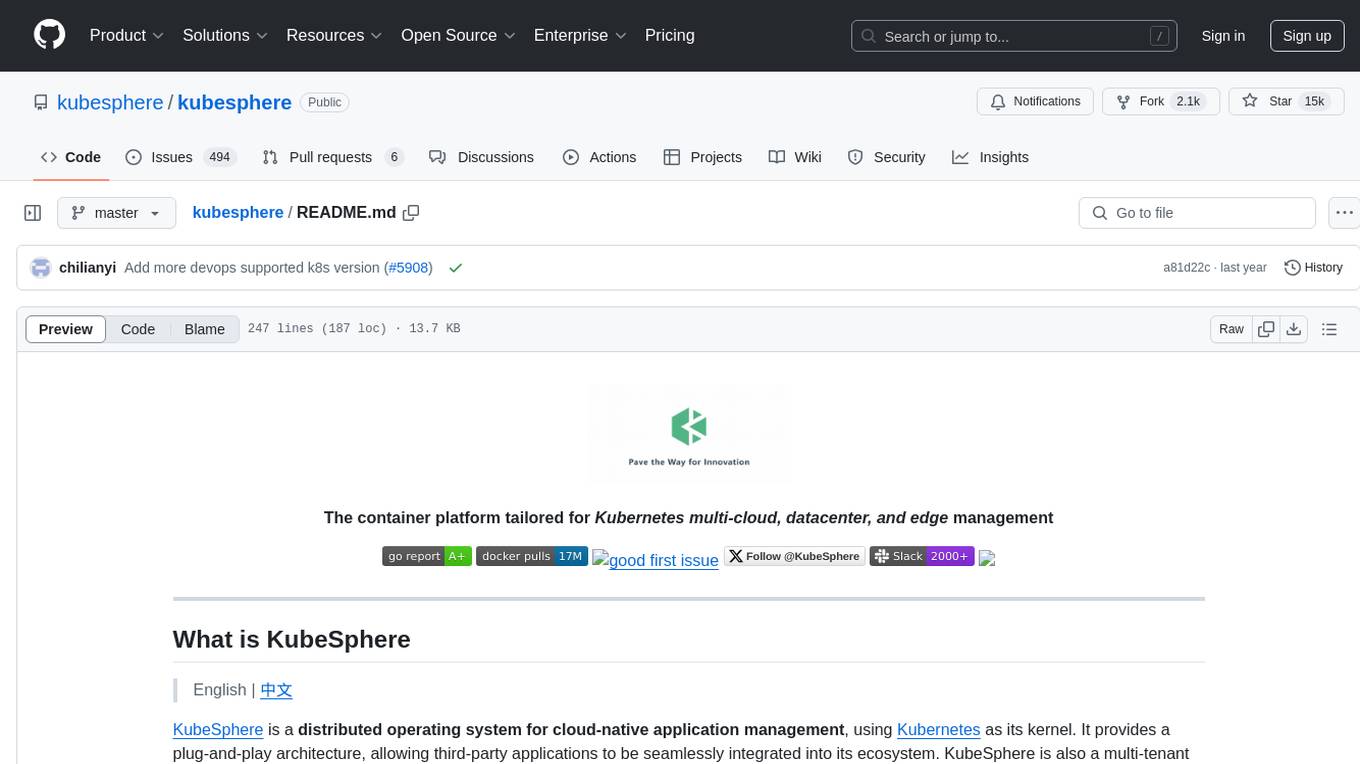
kubesphere
KubeSphere is a distributed operating system for cloud-native application management, using Kubernetes as its kernel. It provides a plug-and-play architecture, allowing third-party applications to be seamlessly integrated into its ecosystem. KubeSphere is also a multi-tenant container platform with full-stack automated IT operation and streamlined DevOps workflows. It provides developer-friendly wizard web UI, helping enterprises to build out a more robust and feature-rich platform, which includes most common functionalities needed for enterprise Kubernetes strategy.

dify
Dify is an open-source LLM app development platform that combines AI workflow, RAG pipeline, agent capabilities, model management, observability features, and more. It allows users to quickly go from prototype to production. Key features include: 1. Workflow: Build and test powerful AI workflows on a visual canvas. 2. Comprehensive model support: Seamless integration with hundreds of proprietary / open-source LLMs from dozens of inference providers and self-hosted solutions. 3. Prompt IDE: Intuitive interface for crafting prompts, comparing model performance, and adding additional features. 4. RAG Pipeline: Extensive RAG capabilities that cover everything from document ingestion to retrieval. 5. Agent capabilities: Define agents based on LLM Function Calling or ReAct, and add pre-built or custom tools. 6. LLMOps: Monitor and analyze application logs and performance over time. 7. Backend-as-a-Service: All of Dify's offerings come with corresponding APIs for easy integration into your own business logic.

DocsGPT
DocsGPT is an open-source documentation assistant powered by GPT models. It simplifies the process of searching for information in project documentation by allowing developers to ask questions and receive accurate answers. With DocsGPT, users can say goodbye to manual searches and quickly find the information they need. The tool aims to revolutionize project documentation experiences and offers features like live previews, Discord community, guides, and contribution opportunities. It consists of a Flask app, Chrome extension, similarity search index creation script, and a frontend built with Vite and React. Users can quickly get started with DocsGPT by following the provided setup instructions and can contribute to its development by following the guidelines in the CONTRIBUTING.md file. The project follows a Code of Conduct to ensure a harassment-free community environment for all participants. DocsGPT is licensed under MIT and is built with LangChain.
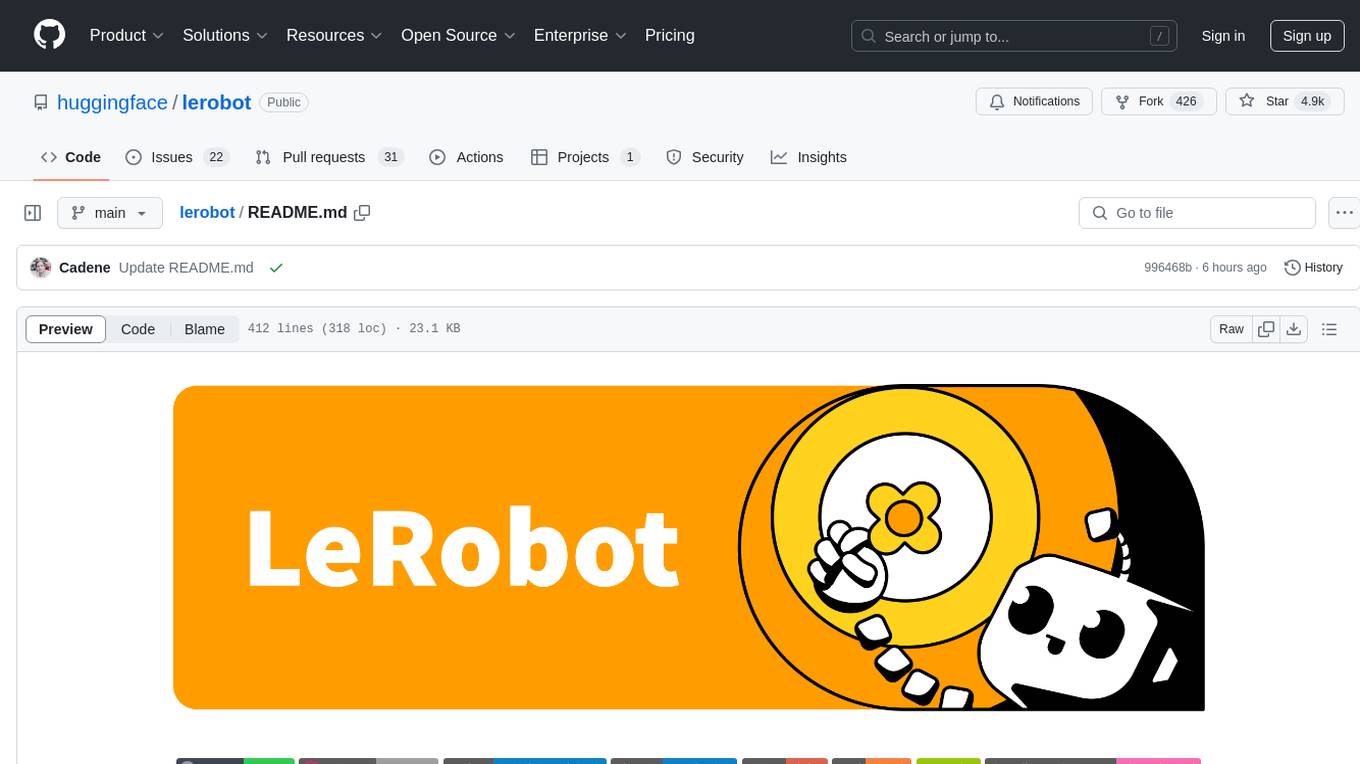
lerobot
LeRobot is a state-of-the-art AI library for real-world robotics in PyTorch. It aims to provide models, datasets, and tools to lower the barrier to entry to robotics, focusing on imitation learning and reinforcement learning. LeRobot offers pretrained models, datasets with human-collected demonstrations, and simulation environments. It plans to support real-world robotics on affordable and capable robots. The library hosts pretrained models and datasets on the Hugging Face community page.
For similar tasks

LLMStack
LLMStack is a no-code platform for building generative AI agents, workflows, and chatbots. It allows users to connect their own data, internal tools, and GPT-powered models without any coding experience. LLMStack can be deployed to the cloud or on-premise and can be accessed via HTTP API or triggered from Slack or Discord.

ai-guide
This guide is dedicated to Large Language Models (LLMs) that you can run on your home computer. It assumes your PC is a lower-end, non-gaming setup.

onnxruntime-genai
ONNX Runtime Generative AI is a library that provides the generative AI loop for ONNX models, including inference with ONNX Runtime, logits processing, search and sampling, and KV cache management. Users can call a high level `generate()` method, or run each iteration of the model in a loop. It supports greedy/beam search and TopP, TopK sampling to generate token sequences, has built in logits processing like repetition penalties, and allows for easy custom scoring.

jupyter-ai
Jupyter AI connects generative AI with Jupyter notebooks. It provides a user-friendly and powerful way to explore generative AI models in notebooks and improve your productivity in JupyterLab and the Jupyter Notebook. Specifically, Jupyter AI offers: * An `%%ai` magic that turns the Jupyter notebook into a reproducible generative AI playground. This works anywhere the IPython kernel runs (JupyterLab, Jupyter Notebook, Google Colab, Kaggle, VSCode, etc.). * A native chat UI in JupyterLab that enables you to work with generative AI as a conversational assistant. * Support for a wide range of generative model providers, including AI21, Anthropic, AWS, Cohere, Gemini, Hugging Face, NVIDIA, and OpenAI. * Local model support through GPT4All, enabling use of generative AI models on consumer grade machines with ease and privacy.

khoj
Khoj is an open-source, personal AI assistant that extends your capabilities by creating always-available AI agents. You can share your notes and documents to extend your digital brain, and your AI agents have access to the internet, allowing you to incorporate real-time information. Khoj is accessible on Desktop, Emacs, Obsidian, Web, and Whatsapp, and you can share PDF, markdown, org-mode, notion files, and GitHub repositories. You'll get fast, accurate semantic search on top of your docs, and your agents can create deeply personal images and understand your speech. Khoj is self-hostable and always will be.

langchain_dart
LangChain.dart is a Dart port of the popular LangChain Python framework created by Harrison Chase. LangChain provides a set of ready-to-use components for working with language models and a standard interface for chaining them together to formulate more advanced use cases (e.g. chatbots, Q&A with RAG, agents, summarization, extraction, etc.). The components can be grouped into a few core modules: * **Model I/O:** LangChain offers a unified API for interacting with various LLM providers (e.g. OpenAI, Google, Mistral, Ollama, etc.), allowing developers to switch between them with ease. Additionally, it provides tools for managing model inputs (prompt templates and example selectors) and parsing the resulting model outputs (output parsers). * **Retrieval:** assists in loading user data (via document loaders), transforming it (with text splitters), extracting its meaning (using embedding models), storing (in vector stores) and retrieving it (through retrievers) so that it can be used to ground the model's responses (i.e. Retrieval-Augmented Generation or RAG). * **Agents:** "bots" that leverage LLMs to make informed decisions about which available tools (such as web search, calculators, database lookup, etc.) to use to accomplish the designated task. The different components can be composed together using the LangChain Expression Language (LCEL).

danswer
Danswer is an open-source Gen-AI Chat and Unified Search tool that connects to your company's docs, apps, and people. It provides a Chat interface and plugs into any LLM of your choice. Danswer can be deployed anywhere and for any scale - on a laptop, on-premise, or to cloud. Since you own the deployment, your user data and chats are fully in your own control. Danswer is MIT licensed and designed to be modular and easily extensible. The system also comes fully ready for production usage with user authentication, role management (admin/basic users), chat persistence, and a UI for configuring Personas (AI Assistants) and their Prompts. Danswer also serves as a Unified Search across all common workplace tools such as Slack, Google Drive, Confluence, etc. By combining LLMs and team specific knowledge, Danswer becomes a subject matter expert for the team. Imagine ChatGPT if it had access to your team's unique knowledge! It enables questions such as "A customer wants feature X, is this already supported?" or "Where's the pull request for feature Y?"

infinity
Infinity is an AI-native database designed for LLM applications, providing incredibly fast full-text and vector search capabilities. It supports a wide range of data types, including vectors, full-text, and structured data, and offers a fused search feature that combines multiple embeddings and full text. Infinity is easy to use, with an intuitive Python API and a single-binary architecture that simplifies deployment. It achieves high performance, with 0.1 milliseconds query latency on million-scale vector datasets and up to 15K QPS.
For similar jobs

h2ogpt
h2oGPT is an Apache V2 open-source project that allows users to query and summarize documents or chat with local private GPT LLMs. It features a private offline database of any documents (PDFs, Excel, Word, Images, Video Frames, Youtube, Audio, Code, Text, MarkDown, etc.), a persistent database (Chroma, Weaviate, or in-memory FAISS) using accurate embeddings (instructor-large, all-MiniLM-L6-v2, etc.), and efficient use of context using instruct-tuned LLMs (no need for LangChain's few-shot approach). h2oGPT also offers parallel summarization and extraction, reaching an output of 80 tokens per second with the 13B LLaMa2 model, HYDE (Hypothetical Document Embeddings) for enhanced retrieval based upon LLM responses, a variety of models supported (LLaMa2, Mistral, Falcon, Vicuna, WizardLM. With AutoGPTQ, 4-bit/8-bit, LORA, etc.), GPU support from HF and LLaMa.cpp GGML models, and CPU support using HF, LLaMa.cpp, and GPT4ALL models. Additionally, h2oGPT provides Attention Sinks for arbitrarily long generation (LLaMa-2, Mistral, MPT, Pythia, Falcon, etc.), a UI or CLI with streaming of all models, the ability to upload and view documents through the UI (control multiple collaborative or personal collections), Vision Models LLaVa, Claude-3, Gemini-Pro-Vision, GPT-4-Vision, Image Generation Stable Diffusion (sdxl-turbo, sdxl) and PlaygroundAI (playv2), Voice STT using Whisper with streaming audio conversion, Voice TTS using MIT-Licensed Microsoft Speech T5 with multiple voices and Streaming audio conversion, Voice TTS using MPL2-Licensed TTS including Voice Cloning and Streaming audio conversion, AI Assistant Voice Control Mode for hands-free control of h2oGPT chat, Bake-off UI mode against many models at the same time, Easy Download of model artifacts and control over models like LLaMa.cpp through the UI, Authentication in the UI by user/password via Native or Google OAuth, State Preservation in the UI by user/password, Linux, Docker, macOS, and Windows support, Easy Windows Installer for Windows 10 64-bit (CPU/CUDA), Easy macOS Installer for macOS (CPU/M1/M2), Inference Servers support (oLLaMa, HF TGI server, vLLM, Gradio, ExLLaMa, Replicate, OpenAI, Azure OpenAI, Anthropic), OpenAI-compliant, Server Proxy API (h2oGPT acts as drop-in-replacement to OpenAI server), Python client API (to talk to Gradio server), JSON Mode with any model via code block extraction. Also supports MistralAI JSON mode, Claude-3 via function calling with strict Schema, OpenAI via JSON mode, and vLLM via guided_json with strict Schema, Web-Search integration with Chat and Document Q/A, Agents for Search, Document Q/A, Python Code, CSV frames (Experimental, best with OpenAI currently), Evaluate performance using reward models, and Quality maintained with over 1000 unit and integration tests taking over 4 GPU-hours.

mistral.rs
Mistral.rs is a fast LLM inference platform written in Rust. We support inference on a variety of devices, quantization, and easy-to-use application with an Open-AI API compatible HTTP server and Python bindings.
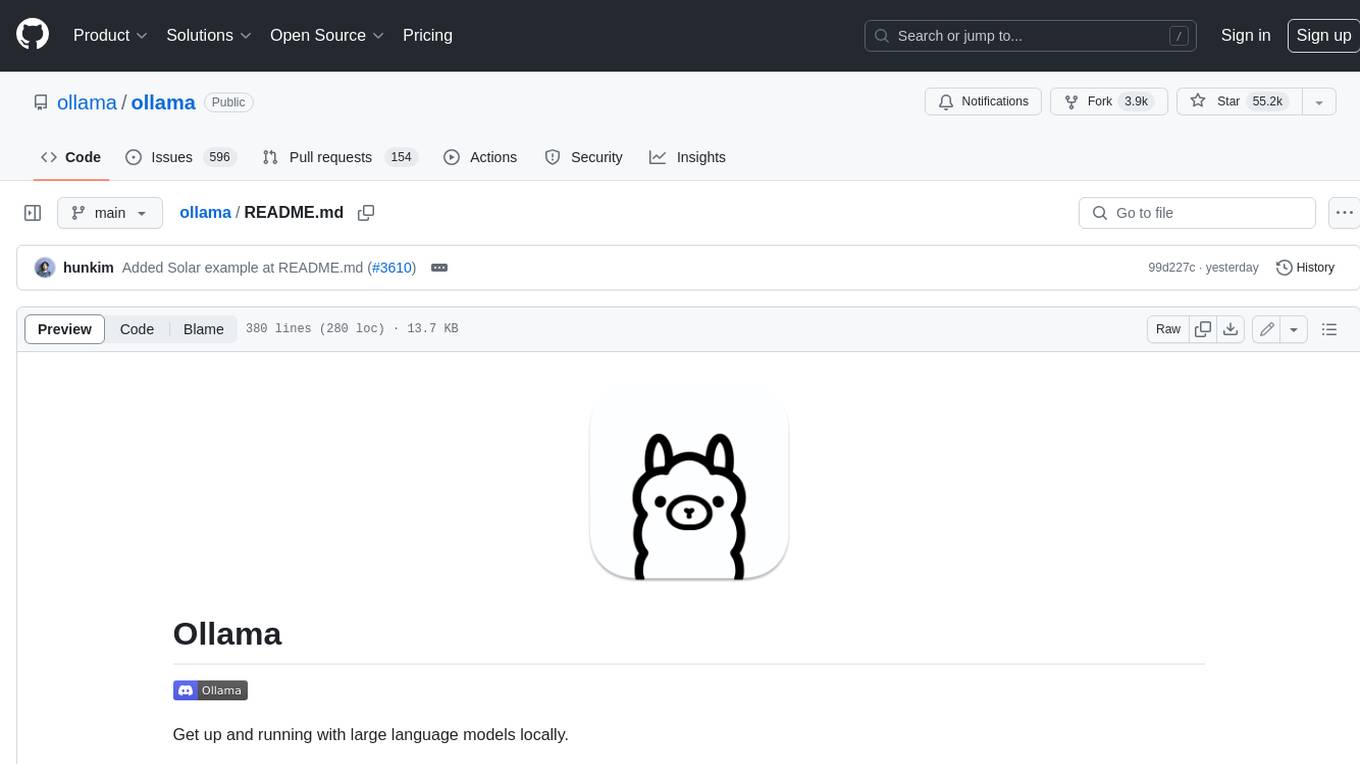
ollama
Ollama is a lightweight, extensible framework for building and running language models on the local machine. It provides a simple API for creating, running, and managing models, as well as a library of pre-built models that can be easily used in a variety of applications. Ollama is designed to be easy to use and accessible to developers of all levels. It is open source and available for free on GitHub.
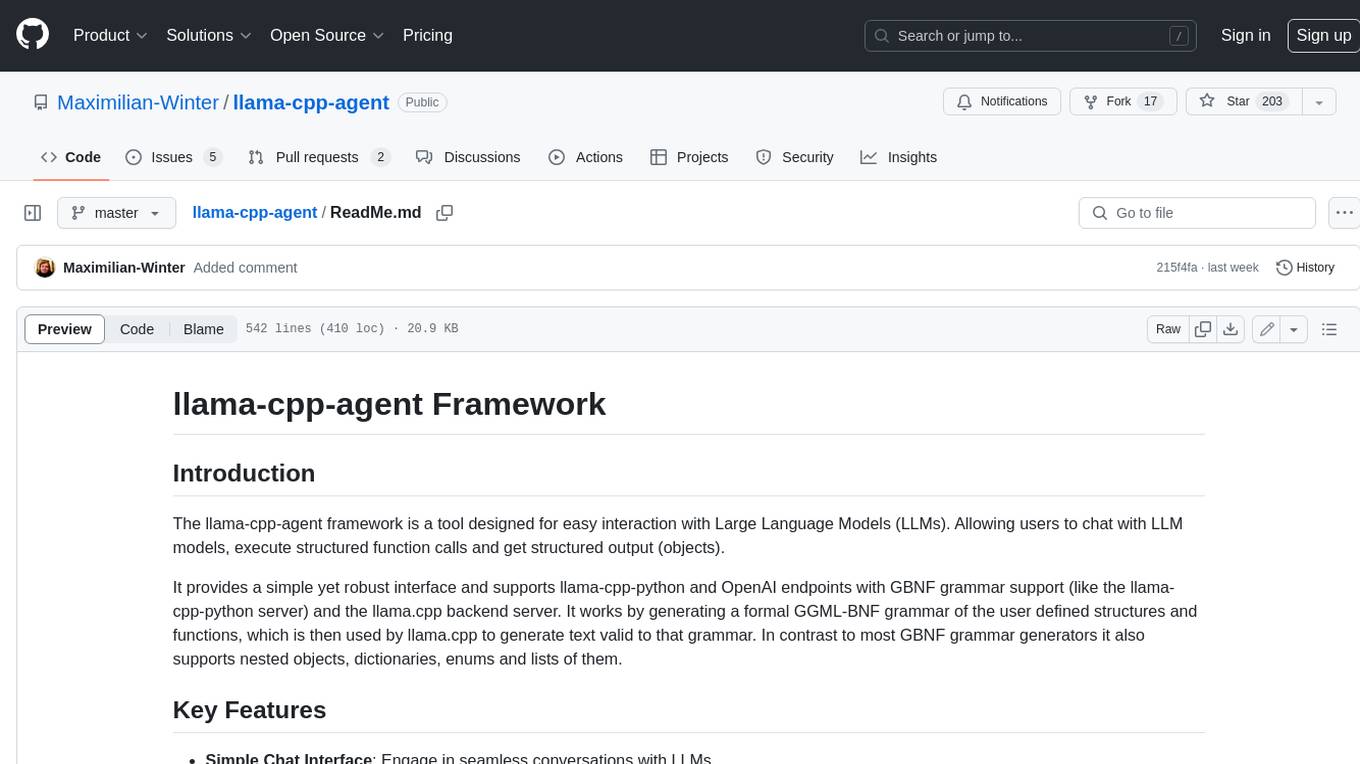
llama-cpp-agent
The llama-cpp-agent framework is a tool designed for easy interaction with Large Language Models (LLMs). Allowing users to chat with LLM models, execute structured function calls and get structured output (objects). It provides a simple yet robust interface and supports llama-cpp-python and OpenAI endpoints with GBNF grammar support (like the llama-cpp-python server) and the llama.cpp backend server. It works by generating a formal GGML-BNF grammar of the user defined structures and functions, which is then used by llama.cpp to generate text valid to that grammar. In contrast to most GBNF grammar generators it also supports nested objects, dictionaries, enums and lists of them.
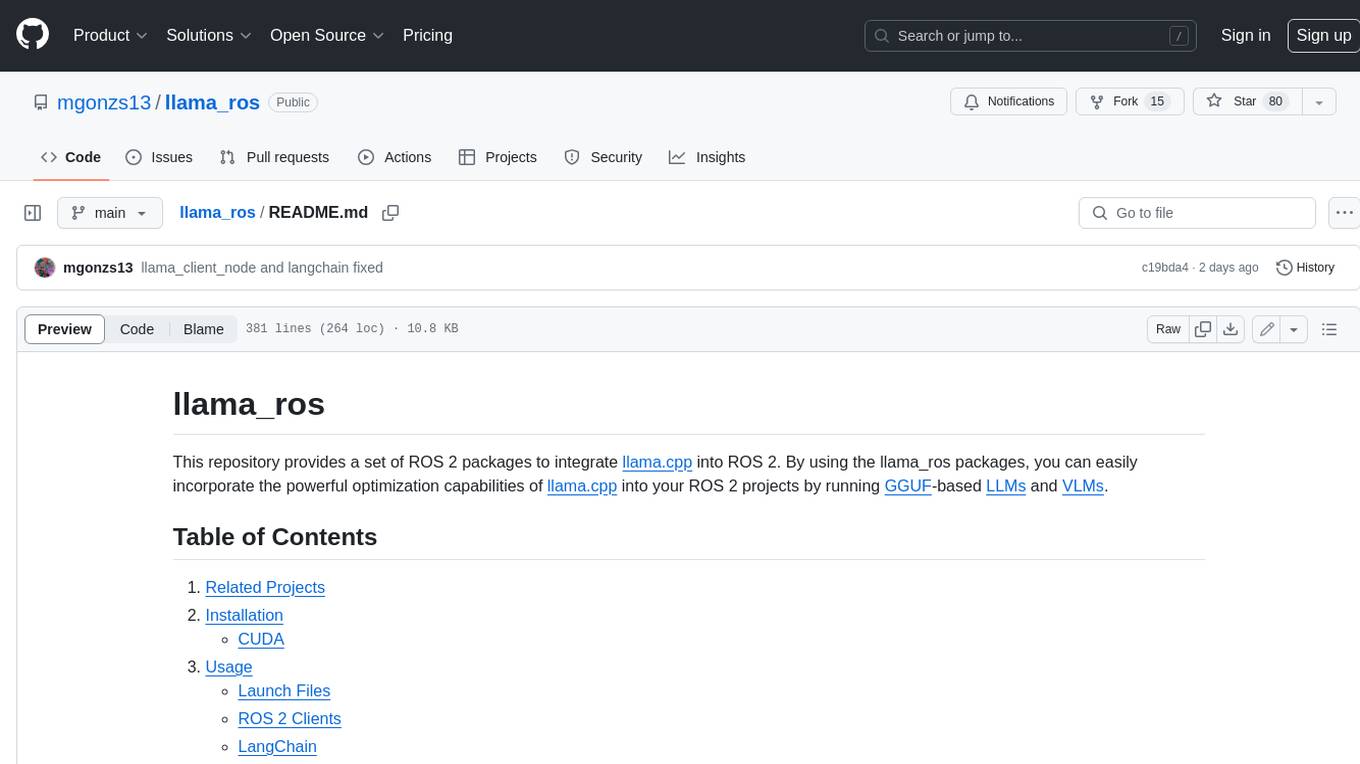
llama_ros
This repository provides a set of ROS 2 packages to integrate llama.cpp into ROS 2. By using the llama_ros packages, you can easily incorporate the powerful optimization capabilities of llama.cpp into your ROS 2 projects by running GGUF-based LLMs and VLMs.
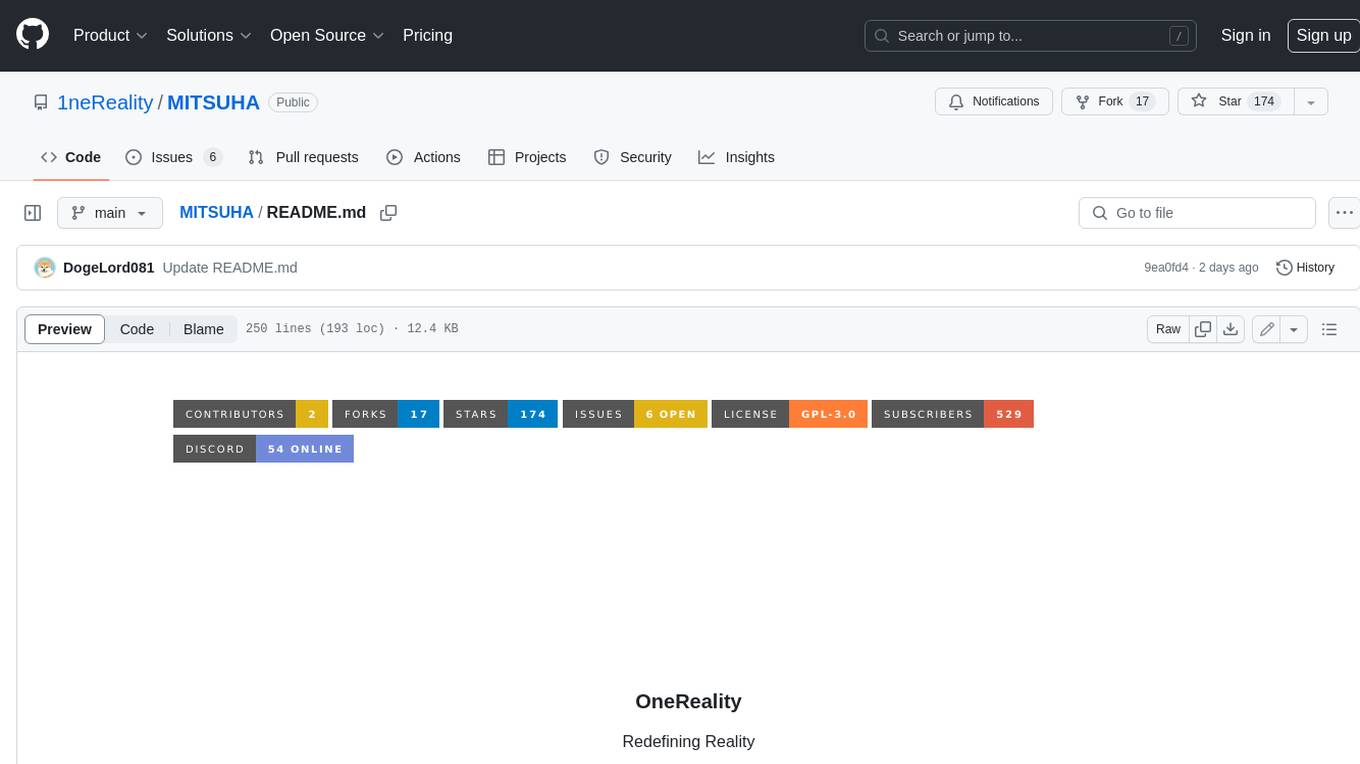
MITSUHA
OneReality is a virtual waifu/assistant that you can speak to through your mic and it'll speak back to you! It has many features such as: * You can speak to her with a mic * It can speak back to you * Has short-term memory and long-term memory * Can open apps * Smarter than you * Fluent in English, Japanese, Korean, and Chinese * Can control your smart home like Alexa if you set up Tuya (more info in Prerequisites) It is built with Python, Llama-cpp-python, Whisper, SpeechRecognition, PocketSphinx, VITS-fast-fine-tuning, VITS-simple-api, HyperDB, Sentence Transformers, and Tuya Cloud IoT.
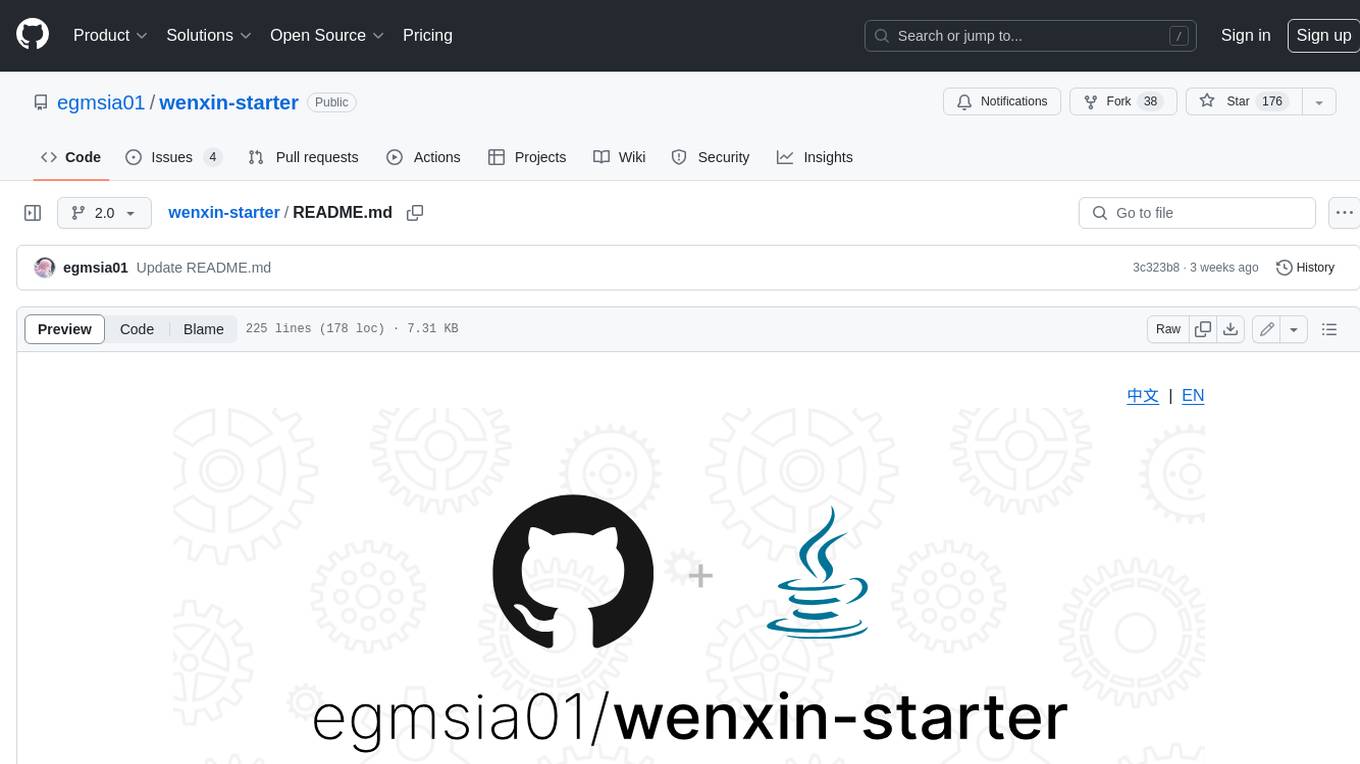
wenxin-starter
WenXin-Starter is a spring-boot-starter for Baidu's "Wenxin Qianfan WENXINWORKSHOP" large model, which can help you quickly access Baidu's AI capabilities. It fully integrates the official API documentation of Wenxin Qianfan. Supports text-to-image generation, built-in dialogue memory, and supports streaming return of dialogue. Supports QPS control of a single model and supports queuing mechanism. Plugins will be added soon.
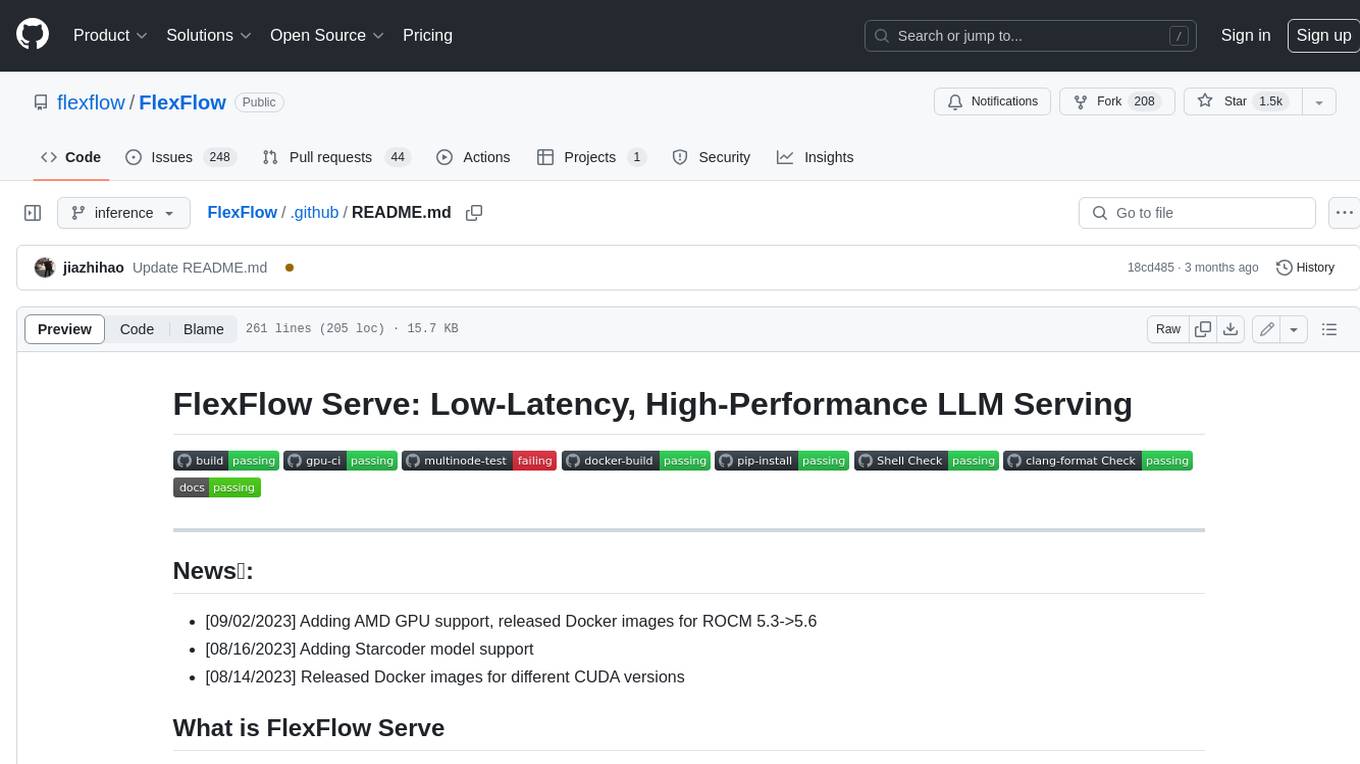
FlexFlow
FlexFlow Serve is an open-source compiler and distributed system for **low latency**, **high performance** LLM serving. FlexFlow Serve outperforms existing systems by 1.3-2.0x for single-node, multi-GPU inference and by 1.4-2.4x for multi-node, multi-GPU inference.




























